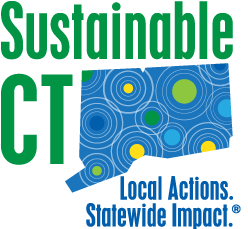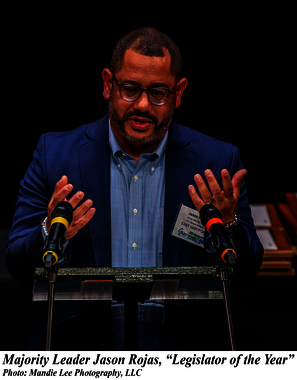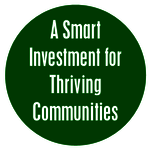Press Releases & Announcements
Requests for press assistance should be directed to the Sustainable CT communications manager, Jim Hunt, via email or by calling 860-259-4732.
Contact:
Jim Hunt, Communications Director
Sustainable CT
860-259-4732
[email protected]
Sustainable CT Announces Five New Board Members
BOZRAH, CT, January 5, 2026 — Sustainable CT, a statewide, voluntary certification program that supports sustainability best practices in Connecticut municipalities, announced the appointment of five new members to its Board of Directors. These individuals share a long history with the organization, and bring a wealth of knowledge in municipal governance, sustainability, and community engagement.
The new Board members are:
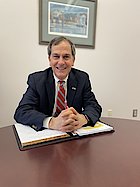
Carl Fortuna
Carl is in his eighth term as the First Selectman in Old Saybrook, CT. Born in Middletown, CT, Carl graduated from Boston College in 1985 and Fordham University School of Law in 1988. After working in New York City for five years, he moved to Old Saybrook in 1994 and soon became a principal in the six-attorney Middletown law firm of Fortuna & Cartelli, PC. He is currently admitted to practice in the CT state courts and the Federal District Court for the District of CT.
In addition to his full-time efforts with the town, Carl has served or currently serves on the board of directors for multiple organizations including: Materials Innovation Recycling Authority (MIRA) Dissolution Authority (formerly MIRA); CCM; Connecticut Interlocal Risk Management Association (CIRMA), the casualty and workers’ compensation insurer for most Connecticut towns; and the Council of Small Towns (COST).
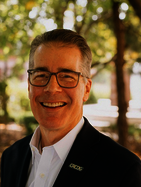
Matt Hart
Matt began his tenure in 2022 as the Executive Director of the Capitol Region Council of Governments (CRCOG), the largest of Connecticut’s regional planning organizations serving 38 municipalities and a population of 976,248 in the greater Hartford region.
Previously, Matt served as the Town Manager in West Hartford and Mansfield. Matt has experience working in the private sector and is a veteran of the US Army and US Army National Guard.
Matt is currently an adjunct faculty member with the University of Connecticut’s Department of Public Policy, which has recognized him for his contributions to the field of public administration and the school. He is also an active member of the International City/County Management Association (ICMA), and the Connecticut Town and City Management Association (CTCMA).
Matt earned his Juris Doctor (JD) and Master’s in Public Affairs (MPA) from the University of Connecticut, and his bachelor’s degree in political science from the State University of New York at Potsdam.
“I’m excited about the opportunity to join my new colleagues on the Board of Directors for Sustainable CT,” said Hart. “I’ve been involved with Sustainable CT since its inception and believe strongly in its mission to innovate and promote sustainable practices across local government. As a town manager and now a COG director, I’ve seen the tangible benefits that the organization provides to residents and communities across our state. I look forward to serving in a leadership role to help support and position Sustainable CT for continued success.”

Adrian Huq
Adrian is a graduate student at the Yale School of the Environment (YSE) pursuing a Master of Environmental Management and a 2024 graduate of Tufts University. Adrian is a cohort member of the Nonprofit Management Program for Emerging Leaders of Color under the Community Foundation for Greater New Haven.
Since 2018, they have worked on several environmental initiatives under the New Haven/Leon Sister City Project (NHLSCP). Most notably, they serve as cofounder of the New Haven Climate Movement (NHCM) Youth Action Team, which advocates for bold climate policy change on the city level (est. 2019).
Across four summers as a Sustainable CT Fellow (2021-2024), Adrian worked with both NVCOG and CRCOG.
They serve on the Board of Directors for the Greater New Haven Green Fund, New Haven/Leon Sister City Project, Citywide Youth Coalition, and Urban Resources Initiative (ex officio). Adrian is also a subcommittee member of the Connecticut Equity and Environmental Justice Advisory Council and was formerly part of the Connecticut Climate Education Advisory Committee.

Maureen Nicholson
Maureen is the First Selectman of the town of Pomfret. First elected in 2013, she was the first woman to serve as First Selectman in the town’s 300-year history.
Maureen sits on the Board of Directors for the Connecticut Conference of Municipalities.
Maureen was the Co-Founder and Editor of the Pomfret Times, a free, monthly newspaper that serves residents of Pomfret. She holds a BS in Landscape Architecture and Horticulture from Cornell University and a MLA in Regional Planning and Landscape Architecture from the University of Pennsylvania.

Ted Shafer
Ted is the President and CEO of the Chamber of Commerce of Northwest CT. Prior to his work with the Chamber, he served as the Director of Economic Development for the Town of Winchester/Winsted and Barkhamsted and was the First Selectman of the town of Burlington for 10 years.
Ted served on the very first Task Force of mayors and first selectmen convened by the Connecticut Conference of Municipalities to dream up what would become Sustainable CT. Ted then served as the Chair of the Advisory Committee that oversaw the creation of Sustainable CT. When Sustainable CT shifted to a Board of Directors, Ted served as the Board Treasurer. His impact on the organization has been significant.
“We’re very fortunate to have this group of dedicated leaders on our Board of Directors as they each have such a deep history with our program,” said Jessica LeClair, Sustainable CT's executive director. “Carl and Maureen have been a part of multiple certifications in their respective towns, and Climate Leader Designations as well; Matt and Ted have been involved with Sustainable CT from the very beginning – Matt as co-chair of our Arts and Culture Working Group, and Ted as an original CCM Task Force member, chair our Adivisory Committee, and treasurer of our Board; and Adrian is our longest serving Fellow of all time, having worked with two different COGs through four consecutive Fellowship cycles. They all understand our program and our towns so well, we’re really looking forward to continuing our journey with them.”
Members of the Sustainable CT Board of Directors serve three-year terms and include leaders in municipal government, business and finance, education, nonprofit organizations, and Connecticut state agencies.
Sustainable CT is especially grateful to departing Board members for their extraordinary service and support: Danielle Chesebrough, public interest consultant and former First Selectman of the Town of Stonington; Laura Francis, Director of the South Central Regional Council of Governments; Sean Ghio, Policy Director at Partnership for Strong Communities; Abby Piersall, Town Planner for the Town of Clinton; and Dave Smith, Vice President, Global EHS at Stanley Black & Decker.
###
About Sustainable CT
Sustainable CT is a free, voluntary certification program that supports and recognizes thriving and resilient Connecticut municipalities. A grassroots, municipal effort, the program provides a comprehensive menu of sustainability best practices, technical assistance, and funding to implement them, and recognition of town accomplishments through certification. Sustainable CT is designed to support all Connecticut municipalities, regardless of size, geography, or resources, and empowers municipalities to create high collective impact for current and future residents.
Contact:
Jim Hunt, Communications Director
Sustainable CT
860-259-4732
[email protected]
Sustainable CT Now Accepting Applications for the 2026 Fellowship Program
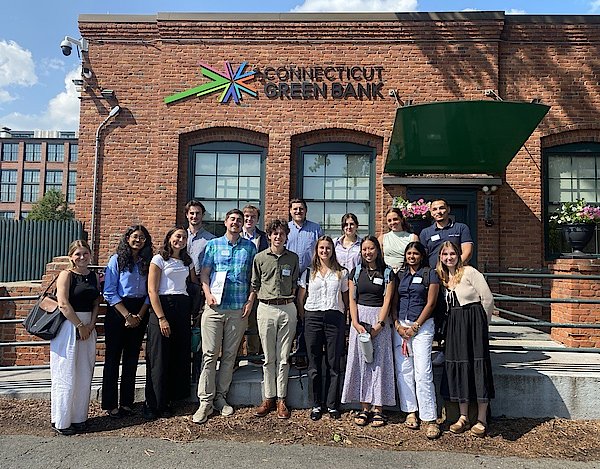
BOZRAH, CT, November 17, 2025 — Sustainable CT is pleased to announce that applications are now being accepted for the 2026 Sustainable CT Fellowship Program, a highly regarded summer initiative that places student Fellows directly with Councils of Governments (COGs) across Connecticut to support communities advancing sustainability.
The Sustainable CT Fellowship Program is a paid, full-time summer position for students who are currently enrolled in a post-secondary degree program or who will graduate during the 2025–2026 academic year. Fellows gain hands-on experience supporting municipalities in implementing Sustainable CT actions, tracking progress toward certification, and fostering community engagement in sustainability initiatives.
Sustainable CT is accepting applications for the 2026 Fellowship Program now through Monday, February 9, 2026, at 5:00 p.m. EST.
“Our Fellowship Program continues to be an invaluable opportunity for students to engage directly with local leaders and help move sustainability efforts forward across the state,” said Lilly Adamo, a Sustainable CT program assistant who is helping to organize the 2026 Fellowship Program. “We’re thrilled to welcome the next cohort of emerging professionals who are passionate about climate action, equity, and community-driven progress.”
Additional details about the Fellowship experience, including host placement locations, can be found on the Sustainable CT Fellowship Program page. Contact Lilly Adamo at [email protected] with questions.
Sustainable CT is a free, voluntary certification program that supports and recognizes thriving and resilient Connecticut municipalities. A grassroots, municipal effort, the program provides a comprehensive menu of sustainability best practices, technical assistance, and funding to implement them, and recognition of town accomplishments through certification. Sustainable CT is designed to support all Connecticut municipalities, regardless of size, geography, or resources, and empowers municipalities to create high collective impact for current and future residents.
The Sustainable CT Fellowship Program has strong multi-year support from the Connecticut Green Bank and the Community Foundation of GreaterNew Haven.
###
Contact:
Jim Hunt, Communications Director
Sustainable CT
860-259-4732
[email protected]
Sustainable CT Holds 2025 Awards Celebration, Announces $100K in “Climate Leader” Prizes to Connecticut Municipalities
Second Annual Campaign for a Sustainable CT is Launched
Majority Leader Jason Rojas Designated "Legislator of the Year"
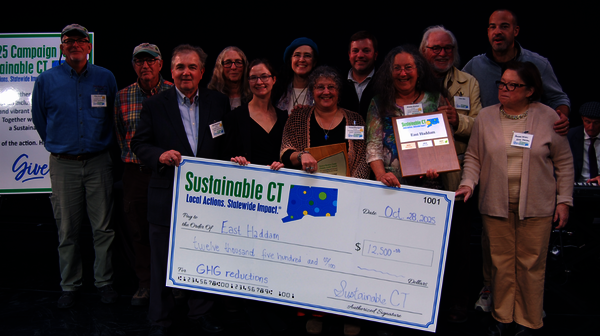
East Haddam receives its Climate Leader prize
BOZRAH, CT, November 3, 2025 — Sustainable CT, a statewide, voluntary certification program that supports sustainability best practices in Connecticut municipalities, held its 2025 Annual Awards Celebration at the Goodspeed Opera House in East Haddam on October 28 and announced grants totaling $100 thousand to Connecticut municipalities to support the reduction of greenhouse gas emissions. In addition, 30 towns and cities earned a total of 36 awards for 2025 – 28 municipal certifications and eight Climate Leader designations. The number of awards achieved this fall represents a new record for a single Sustainable CT certification cycle.
Dubbed “a big surprise” prior to the event, prizes to Climate Leader designees were announced to an appreciative audience of municipal administrators and volunteers. The prizes, $12,500 to each of the eight Climate Leader designees, are intended to help these communities continue to reduce their greenhouse gas emissions.
2025 Climate Leader designees, and prize recipients, include East Haddam, Hamden, Manchester, Mansfield, Middletown, Norwalk, Pomfret, and Vernon. The prize program, a first in Sustainable CT’s seven-year history, will be repeated in 2026 and 2027, providing other Connecticut municipalities with incentive to pursue their own Climate Leader designations in the Sustainable CT certification program. The total amount to be awarded each year will be capped at $100K and divided equally to Climate Leader designees, so the amount dispersed to each town will depend on how many towns achieve Climate Leader designation in a given year.
“When it comes to preventing dangerous climate change, the work is ongoing,” said Jessica LeClair, Sustainable CT’s Executive Director. “There is a sense of urgency in taking action on climate, and real change can be made at the local level. These eight communities have aproven track record of success, and we are thrilled to be able to support their continued work.”
Sustainable CT also took the opportunity to announce the kick-off of its “2025 Campaign for a Sustainable CT” to run through December 31, 2025. In its second year, this direct fundraising campaign invites the public to amplify support for sustainability efforts across the state.
An exciting addition to this year’s Campaign is a gift drawing associated with the fundraising effort. Visitors to the Campaign’s donation platform can enter to win one of two special prizes: a Half Dome 2 tent courtesy of REI Norwalk (a $350 value) or an Electra Pronto Go! ebike courtesy of Mystic Cycle Centre (a $2700 value). A donation is not required to enter the drawing.
“This campaign is a unique opportunity for everyone to directly contribute to sustainability efforts that make an immediate, tangible impact in their communities,” said Jim Hunt, Sustainable CT’s Director for Communications and Development. “Thanks to the generous support of REI Norwalk and Mystic Cycle Centre, we’re providing donors with a little more incentive to help us expand our reach and support even more towns across the state in building vibrant, resilient and sustainable communities.”
In addition to Sustainable CT staff and members of the Board of Directors, Connecticut House Majority Leader Jason Rojas addressed the gathering. The life-long East Hartford resident was the recipient of Sustainable CT’s first “Legislator of the Year” award in recognition of his support of the organization and Connecticut communities.
Since its inception, Sustainable CT has grown to include 139 participating towns – over 90% of the state’s population – 67 certified municipalities, and 20 Climate Leaders. The organization has sponsored 99 Fellowships for Connecticut college students. The Sustainable CT Community Match Fund, currently in its sixth year, has supported 394 local projects across the state, and has invested more than $4.8 million in community.
Sustainable CT has strong multi-year support from the Emily Hall Tremaine Foundation, Hampshire Foundation, Common Sense Fund, Connecticut Green Bank and the Community Foundation of Eastern Connecticut.
###
About Sustainable CT
Sustainable CT is a free, voluntary certification program that supports and recognizes thriving and resilient Connecticut municipalities. A grassroots, municipal effort, the program provides a comprehensive menu of sustainability best practices, technical assistance, and funding to implement them, and recognition of town accomplishments through certification. Sustainable CT is designed to support all Connecticut municipalities, regardless of size, geography, or resources, and empowers municipalities to create high collective impact for current and future residents.
Contact:
Jim Hunt, Communications Director
Sustainable CT
860-259-4732
[email protected]
Sustainable CT Honors 30 Municipalities Across Connecticut in 2025
Record-breaking fall certification cycle highlights local leadership in sustainability
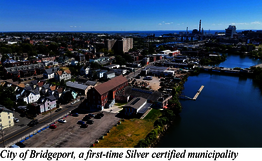
BOZRAH, CT, October 2, 2025 – Sustainable CT, a statewide, voluntary certification program that supports sustainability best practices in Connecticut municipalities, announced a new record for municipal certifications and Climate Leader designations in a single certification cycle.
30 towns and cities are earning a total of 36 awards in 2025 – 28 municipal certifications and eight Climate Leader designations. And the number of awards achieved this fall represents a new record for a single certification cycle.
Gold Certified Municipalities:
- East Haddam
- Hamden
- Manchester
- Mansfield
- Norwalk
- Vernon
These six communities achieved the program’s highest honor, demonstrating exceptional leadership and innovation. Their comprehensive sustainability strategies serve as models for other towns and cities across the state.
Silver Certified Municipalities:
- Bridgeport
- Coventry
- Darien
- Haddam
- Madison
- Marlborough
- Ridgefield
- Rocky Hill
- Southbury
- Stamford
- Windham
Silver Certification reflects advanced initiatives in sustainable practices and community engagement. This achievement highlights a proactive approach to sustainability and an extraordinary commitment to equity.
Bronze Certified Municipalities:
- Andover
- Beacon Falls
- Cheshire
- Essex
- Guilford
- Roxbury
- Torrington
- Waterford
- West Haven
- Windsor
- Woodbridge
Bronze certification celebrates significant achievements across a range of sustainability actions, including environmental stewardship, public health, and social equity. Their Bronze certification is a testament to their dedication and collaborative efforts towards creating vibrant and sustainable communities.
This year also welcomed three first-time certified communities: Andover and Beacon Falls, earning Bronze; and Bridgeport earning Silver certification.
“We’ve worked hard on initiatives to preserve our tree canopy, in energy conservation and efficiency, climate mitigation and resiliency,” said Chadwick Schroeder, Sustainability Manager for the City of Bridgeport. “It means a lot to have our efforts recognized by Sustainable CT and share in the celebration of our peers. It’s great incentive to help us move forward to achieve even more.”
Climate Leader Designees:
- East Haddam
- Hamden
- Manchester
- Mansfield
- Middletown
- Norwalk
- Pomfret
- Vernon
The Climate Leader designation is reserved for municipalities making notable progress in cutting greenhouse gas emissions and strengthening climate resilience. These eight municipalities have set the bar for climate action in Connecticut.
“We’ve had a remarkable fall,” said Jessica LeClair, executive director of Sustainable CT. “This cycle resulted in a record number of awards, underscoring the creativity and dedication of our communities. We’re especially proud that some of Connecticut’s smallest and largest communities earned certification. The leadership demonstrated by our awardees ensures that Connecticut will continue to grow as a healthier, more resilient, and more vibrant place to live, work, and visit.”
Sustainable CT certifications are awarded based on municipalities completing a broad range of sustainability measures—covering everything from inclusive community engagement and local economic development to arts, culture, and environmental health. To achieve certification, municipalities must show measurable progress in 12 impact areas. The Climate Leader designation recognizes towns that commit to ongoing greenhouse gas reductions and climate adaptation efforts.
Certifications are valid for three years, during which municipalities can continue to expand their initiatives. Sustainable CT provides a detailed framework and support for municipalities striving to enhance their sustainability and community well-being.
All certified communities will be celebrated at Sustainable CT’s 2025 Awards Celebration on October 28 at the Goodspeed Opera House in East Haddam.
For more information about Sustainable CT and the certification process, please visit sustainablect.org.
Sustainable CT has strong multi-year support from the Emily Hall Tremaine Foundation, Hampshire Foundation, Common Sense Fund, Connecticut Green Bank and the Community Foundation of Eastern Connecticut.
###
About Sustainable CT
Sustainable CT is a free, voluntary certification program that supports and recognizes thriving and resilient Connecticut municipalities. A independently funded, grassroots, municipal effort, the program provides a comprehensive menu of sustainability best practices, technical assistance, and funding to implement them, and recognition of town accomplishments through certification. Sustainable CT is designed to support all Connecticutmunicipalities, regardless of size, geography, or resources, and empowers municipalities to create high collective impact for current and future residents.
Contact:
Jim Hunt, Communications Manager
Sustainable CT
860-259-4732
[email protected]
Connecticut Communities Recognized for Certification and Climate Leader Designation
Vernon earns GOLD certification
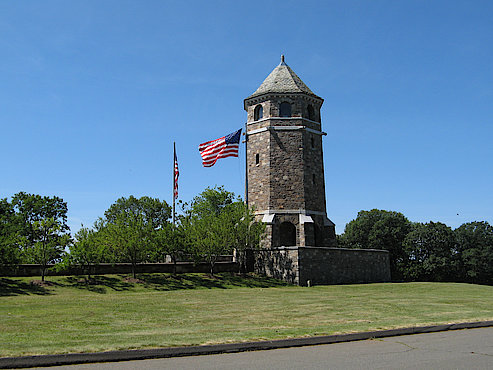
BOZRAH, CT, May 29, 2025 – Sustainable CT, a voluntary certification program to recognize thriving and resilient Connecticut municipalities, is proud to announce the certification achievements of five towns for their exceptional commitment to sustainability.
Achieving the highest level of certification, the Town of Vernon has showcased extraordinary leadership and innovation in sustainability. The town’s Gold certification recognizes comprehensive and effective sustainability strategies that serve as a model for other municipalities. Vernon has also achieved Climate Leader designation – a mark of distinction required of Gold level certification.
The Town of Marlborough has achieved Silver certification, highlighting their proactive approach to sustainability, and reflecting the town’s advanced initiatives in sustainable practices and community engagement.
The Cities of Norwalk and Stamford have earned Bronze certification, demonstrating significant achievements across a range of sustainability actions, including environmental stewardship, public health, and social equity.
Additionally, the Town of Mansfield has achieved Climate Leader designation. Climate Leader designation is awarded to municipalities that demonstrate outstanding leadership in addressing climate change through reducing greenhouse gas emissions and implementing climate resilience strategies.
"We’re thrilled to celebrate these towns for their impressive achievements," said Jessica LeClair, executive director of Sustainable CT. "Their certifications and climate leadership exemplify the dedication and innovative spirit that are essential for building a sustainable future. We congratulate each community for their hard work and commitment to making Connecticut a better place to live, work, and visit. And we are particularly proud of Vernon for its outstanding work in achieving Gold certification.”
Sustainable CT certifications are awarded based on the completion of a broad range of sustainability actions, from community building and thriving local economies to vibrant arts and culture and environmental stewardship. Municipalities must demonstrate significant achievements across twelve impact areas to qualify for certification.
“Once again, our municipalities have successfully initiated and implemented projects that address climate resilience, energy efficiency, equity, land conservation, waste reduction, and economic development, among other important priorities,” said Nicole Chevalier, co-chair of Sustainable CT’s Board of Directors. “The work these towns do is critical to achieving the state’s ambitious environmental and climate objectives and we are incredibly proud of them.”
Michael Purcaro, co-chair of Sustainable CT Board of Directors, sees profound changes taking place across the state. “By recognizing the natural environment as the foundation for the health and well-being of all people, our sustainable initiatives are driving real change in towns and cities across Connecticut,” said Purcaro. “We’re seeing improved efficiency in the delivery of government services, significant cost savings and a stronger sense of community. We congratulate our award recipients and commend them for their collective work to create a more vibrant state that provides opportunities for all to thrive.”
Certification is effective for three years, during which time the towns can continue to implement and build upon their sustainability initiatives.
All these towns will be recognized at Sustainable CT’s 2025 Spring into Summer Celebration on June 4 at The Mark Twain House & Museum in Hartford. The official annual awards ceremony for these and other towns that earn certification and Climate Leader designation during 2025 will be held in the Fall.
For more information about Sustainable CT and the certification process, please visit sustainablect.org.
Sustainable CT is independently funded, with strong multi-year support from the Emily Hall Tremaine Foundation, Hampshire Foundation, Common Sense Fund, Connecticut Green Bank, and the Community Foundation of Eastern Connecticut.
###
About Sustainable CT
Sustainable CT is a free, voluntary certification program that supports and recognizes thriving and resilient Connecticut municipalities. An independently funded, grassroots, municipal effort, the program provides a comprehensive menu of sustainability best practices, technical assistance, and funding to implement them, and recognition of town accomplishments through certification. Sustainable CT is designed to support all Connecticut municipalities, regardless of size, geography, or resources, and empowers municipalities to create high collective impact for current and future residents.
We need your voice - today.
The Connecticut General Assembly’s Appropriations Committee is making critical budget decisions this week, and Sustainable CT needs your support. We’re urging the Committee to include $1 million over two years in the state budget to support Sustainable CT’s mission of creating more equitable, sustainable, and resilient communities across Connecticut.
Why this investment matters.
Sustainable CT has helped over 130 municipalities advance clean energy, climate resilience, affordable housing, local economies, and more. Our work supports towns and cities of all sizes and political backgrounds, fostering collaboration, innovation, and measurable progress.
Our impact (so far):
- Number of municipalities currently registered: 138 (82%), representing 91% of the state's population
- Number of municipalities currently certified: 62
- Currently certified Bronze: 37
- Currently certified Silver: 19
- Currently certified Gold: 6
- Number of municipalities currently designated as Climate Leaders: 15
- Number of sustainability actions completed: 4,708
The Sustainable CT Community Match Fund has:
- Supported 377 projects in 85 Connecticut towns
- Enabled 24,477 individual donations totaling $2.4 million
- Provided $2.1 million in matching funds from Sustainable CT
- Facilitated a $4.5 million investment in Connecticut communities
Funding for Sustainable CT is a smart state investment that empowers local governments, fosters economic growth, and ensures long-term sustainability for Connecticut’s communities.
Take action now.
Please email or call members of the Appropriations Committee today and urge them to support Sustainable CT’s funding request of $1 million over FY 2026–FY 2027.
See our list to contact Appropriations Committee members
Sample language (please personalize):
“I’m writing to urge your support for Sustainable CT’s request for $1 million over two years in the state budget. Sustainable CT delivers unmatched value by supporting local governments with tools, funding, and technical assistance to build more sustainable and equitable communities. This investment will pay dividends across Connecticut and deserves your support.”
Every voice matters.
Please act now—and share this alert with your networks. With your help, we can keep Connecticut moving toward a more sustainable future.
THANK YOU!
The Sustainable CT Team
Contact:
Jim Hunt, Communications Manager
Sustainable CT
860-259-4732
[email protected]
Sustainable CT Announces Three New Board Members
BOZRAH, CT, January 31, 2025 — Sustainable CT, a statewide, voluntary certification program that supports sustainability best practices in Connecticut municipalities, today announced the appointment of three new members to its Board of Directors. These individuals bring a wealth of experience and expertise in sustainability, municipal governance, and community engagement to the organization.
The new Board members are:

Cecelia Drayton. Ms. Drayton serves as the director of sustainability for the City of Hartford. In her capacity, she is responsible for advancing the City’s economy, improving public health, and promoting social equity through environmental stewardship initiatives in the Climate Action Plan.
Prior to joining the Office of Sustainability, Ms. Drayton served as the residential deputy program manager at Leidos, where she implemented energy efficiency programs through 25 community action agencies and low-income households throughout the Ameren Illinois utility territory.
Her formal education includes a Master of Applied Science in Environmental Policy and Management with a concentration in energy and sustainability from the University of Denver, a Bachelor of Science and Technology in Plant Science from the State University of New York, and an Associate in Applied Science in Landscape Contracting and Development from the State University of New York.

Ashley Stewart Brown. Ms. Brown is the manager for community engagement at the CT Green Bank. At the CT Green Bank, Ashley supports the development of partnerships between communities and the state in investments in our environmental infrastructure.
Ms. Brown is a distinguished Switzer Fellow and an Outdoor Afro Leader in Connecticut. She is an active member of her local regional land trust, Traprock Ridge Land Conservancy, and serves on the board of CT Fair Housing Center.
Ms. Brown earned her B.S. in Civil Engineering from Temple University, and a master’s degree from Yale University’s School of the Environment.
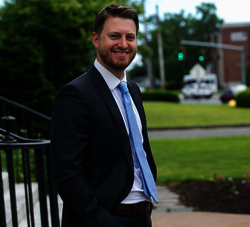
Steve Stephanou. Mr. Stephanou is currently the town manager for the Town of Manchester. In this role, he serves as chief executive for a full-service municipality that includes 550 full time employees and an annual budget of $275 million.
Prior to joining the Town, he worked for the City of Boston, serving in various roles including deputy commissioner of administration and finance and management analyst. Mr. Stephanou holds a Master of Public Administration from New York University and a B.A. from the University of Connecticut.
He is a certified public finance officer (CPFO) and serves as vice chair of the CT Advisory Commission on Intergovernmental Relations (ACIR). He is a policy board member of the Capitol Region Council of Governments (CRCOG) and an active member of the Connecticut Conference of Municipalities (CCM).
“I am thrilled and honored to join the Board of Sustainable CT”, said Stephanou. “Sustainable CT has been a tremendous asset for the Town of Manchester in our mission to be a more thriving, efficient, and resilient community. I look forward to working with the talented staff and fellow Board members in supporting cities and towns across our state in achieving their sustainability goals.”
“It's a privilege to have Cecelia, Ashley and Steve on our Board of Directors,” said Jessica LeClair, Sustainable CT's executive director. “Their diverse backgrounds and deep commitment to building stronger, more sustainable communities will be invaluable as we continue our work to support municipalities across Connecticut.”
Members of the Sustainable CT Board of Directors serve three-year terms and include leaders in municipal government, business and finance, education, nonprofit organizations, and Connecticut state agencies.
Sustainable CT is especially grateful to departing Board members for their extraordinary service and support: Bryan Garcia, president and CEO of Connecticut Green Bank; Latha Swamy, director, Food System Policy Division for the City of New Haven; and Sheila McKay, associate executive director for government relations with the Connecticut Association of Boards of Education.
###
About Sustainable CT
Sustainable CT is a free, voluntary certification program that supports and recognizes thriving and resilient Connecticut municipalities. An independently funded, grassroots, municipal effort, the program provides a comprehensive menu of sustainability best practices, technical assistance, and funding to implement them, and recognition of town accomplishments through certification. Sustainable CT is designed to support all Connecticut municipalities, regardless of size, geography, or resources, and empowers municipalities to create high collective impact for current and future residents.
Contact:
Jim Hunt, Communications Manager
Sustainable CT
860-259-4732
[email protected]
Sustainable CT Holds 2024 Awards Celebration, Announces “The Campaign for a Sustainable CT”
Campaign is First Appeal Directly to Connecticut Residents and Includes a Dollar-for-Dollar Match
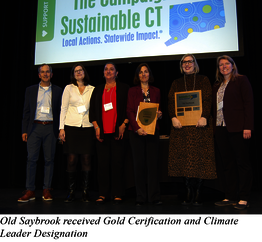
OLD SAYBROOK, CT, November 15, 2024 — Sustainable CT, a statewide, voluntary certification program that supports sustainability best practices in Connecticut municipalities, held its 2024 Annual Awards Celebration at the Katharine Hepburn Cultural Arts Center (“The Kate”) in Old Saybrook on Wednesday, November 13. A total of 43 awards – 32 municipal certifications and 11 Climate Leader designations – were conveyed to Connecticut municipalities this year, making it the highest level of annual achievement in the organization’s seven-year history.
In addition to Sustainable CT staff and members of the Board of Directors, speakers included Carl Fortuna, First Selectman of Old Saybrook, Sabina Shelby, President of Hampshire Foundation, State Senator and Essex First Selectman Norm Needleman, and Carolyn Lyle of Old Saybrook SOS Trees, a Community Match Fund-supported project.
“Old Saybrook was thrilled to host Sustainable CT certified communities from all over the state at the Katharine Hepburn Cultural Arts Center,” said First Selectman Fortuna. “I would like to thank Sustainable CT for promoting their programs to Connecticut’s cities and towns to spread the word on sustainability. Having achieved Gold certification for the first time, Old Saybrook can attest to the merits of the program, and we look forward to building on our prior successes.”
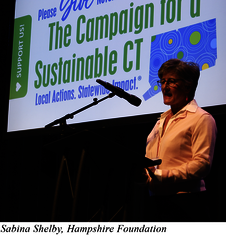
The Campaign for a Sustainable CT
Jessica LeClair, Executive Director of Sustainable CT, also announced the start of the organization’s first-ever direct fundraising campaign to Connecticut residents, "The Campaign for a Sustainable CT." From November 13 through December 31, 2024, the public is invited to join this unique opportunity to amplify its support for sustainability efforts across the state. The Hampshire Foundation has generously offered to match every contribution dollar-for-dollar, doubling the impact of each gift.
With this historic fundraising initiative, Sustainable CT aims to connect directly with Connecticut residents, inviting them to play a vital role in supporting programs that empower towns and cities to enhance environmental health, economic strength, and quality of life. The organization has long provided resources, technical assistance, and certification programs to municipalities, helping communities address pressing needs in areas such as clean energy, waste reduction, and affordable housing.
"This campaign is a unique opportunity for all Connecticut residents to directly contribute to sustainability efforts that make an immediate, tangible impact in their communities," said Executive Director LeClair. "Thanks to a generous dollar-for-dollar matching donation, every contribution received during this campaign will go twice as far, enabling us to expand our reach and support even more towns across the state in building vibrant, resilient and sustainable communities."
Since its inception, Sustainable CT has grown to include 138 participating towns – over 90% of the state’s population – 70 certified municipalities, and 16 Climate Leaders. The organization has sponsored 88 Fellowships for Connecticut college students. The Sustainable CT Community Match Fund, currently celebrating its fifth year, has supported 350 local projects across the state, and has invested more than $4 million in community.
How to Donate
Supporters can make a tax-deductible donation online through the “SUPPORT US!” tab on the Sustainable CT website, sustainablect.org. Gifts of all sizes are welcomed, and each donation will be matched to maximize the impact of every dollar.
###
About Sustainable CT
Sustainable CT is a free, voluntary certification program that supports and recognizes thriving and resilient Connecticut municipalities. An independently funded, grassroots, municipal effort, the program provides a comprehensive menu of sustainability best practices, technical assistance, and funding to implement them, and recognition of town accomplishments through certification. Sustainable CT is designed to support all Connecticut municipalities, regardless of size, geography, or resources, and empowers municipalities to create high collective impact for current and future residents.
Contact:
Jim Hunt, Communications Manager
Sustainable CT
860-259-4732
[email protected]
Sustainable CT Confers a Record 43 Awards on Connecticut Municipalities in 2024
Eight communities earn their first certification
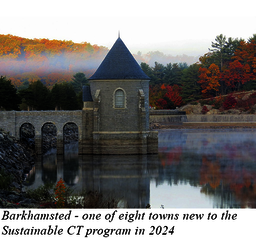
BOZRAH, CT, October 7, 2024 – Sustainable CT, a statewide, voluntary certification program that supports sustainability best practices in Connecticut municipalities, announced a new record for municipal certifications and Climate Leader designations for 2024.
A total of 43 awards – 32 municipal certifications and 11 Climate Leader designations – have been earned by Connecticut municipalities this year, making it the highest level of annual achievement in the organization’s seven-year history.
Gold Certification Recipients:
- Bristol
- Fairfield
- Glastonbury
- Old Saybrook
- West Hartford
Achieving the highest level of certification, these communities have showcased extraordinary leadership and innovation in sustainability. Their Gold certifications recognize comprehensive and effective sustainability strategies that serve as models for other municipalities.
Silver Certification Recipients:
- Deep River
- East Haddam
- Greenwich
- Groton (Fall certification cycle)
- Litchfield
- Marlborough (Fall certification cycle)
- Milford
- Southbury
Silver Certification reflects advanced initiatives in sustainable practices and community engagement. This achievement highlights a proactive approach to sustainability and an extraordinary commitment to equity.
Bronze Certification Recipients:
- Barkhamsted
- Bethel
- Canaan (Falls Village)
- Colchester
- Durham
- Ellington
- Groton (Spring certification cycle)
- Haddam
- Killingly
- Madison
- Marlborough (Spring certification cycle)
- Monroe
- Norwalk
- Pomfret
- Preston
- Ridgefield
- Stamford
- Suffield
- Thomaston
These 19 municipalities have demonstrated significant achievements across a range of sustainability actions, including environmental stewardship, public health, and social equity. Their Bronze certification is a testament to their dedication and collaborative efforts towards creating vibrant and sustainable communities.
This year, eight municipalities earned their first certification in the program, with Barkhamsted, Bethel, Colchester, Ellington, Haddam, Monroe, Preston and Thomaston achieving bronze certification for the first time.
Climate Leader Designees:
- Branford
- Bristol
- East Haddam
- East Lyme
- Fairfield
- Glastonbury
- Greenwich
- Hamden
- Litchfield
- Old Saybrook
- West Hartford
The Climate Leader designation is awarded to municipalities that demonstrate outstanding leadership in addressing climate change through reducing greenhouse gas emissions and implementing climate resilience strategies. These 11 municipalities have set a high standard for climate action and serve as exemplary leaders in the state.
"It’s been a banner year for us, but even more so for Connecticut cities and towns,” said Jessica LeClair, executive director of Sustainable CT. “A record number of certifications and climate leadership designations exemplifies the dedication and innovative spirit that are essential for building a sustainable future. And we’re especially happy to add eight new towns to the program. Thanks to their hard work and commitment, we’re expanding our reach, and Connecticut continues to be an ever-better place to live, work, play and visit."
Sustainable CT certifications are awarded based on the completion of a broad range of sustainability actions, from community building and thriving local economies to vibrant arts and culture and environmental stewardship. Municipalities must demonstrate significant achievements across thirteen impact areas to qualify for certification. The Climate Leader designation recognizes municipalities that have completed rigorous actions to address climate change and have committed to ongoing efforts to reduce greenhouse gas emissions and adapt to the changing climate.
Certification is effective for three years, during which time the towns can continue to implement and build upon their sustainability initiatives. Sustainable CT provides a detailed framework and support for municipalities striving to enhance their sustainability and community well-being.
All these towns will be recognized at Sustainable CT’s 2024 Annual Awards Celebration on November 13 at the Katharine Hepburn Cultural Arts Center – “the Kate” – in Old Saybrook, from 4 to 7 p.m.
For more information about Sustainable CT and the certification process, please visit sustainablect.org.
Sustainable CT is independently funded, with strong multi-year support from the Emily Hall Tremaine Foundation, Hampshire Foundation, Common Sense Fund, Connecticut Green Bank, and the Community Foundation of Eastern Connecticut.
###
About Sustainable CT
Sustainable CT is a free, voluntary certification program that supports and recognizes thriving and resilient Connecticut municipalities. An independently funded, grassroots, municipal effort, the program provides a comprehensive menu of sustainability best practices, technical assistance, and funding to implement them, and recognition of town accomplishments through certification. Sustainable CT is designed to support all Connecticut municipalities, regardless of size, geography, or resources, and empowers municipalities to create high collective impact for current and future residents.
Contact:
Jim Hunt, Communications Manager
Sustainable CT
860-259-4732
[email protected]
Celebrating Five Years of the Sustainable CT Community Match Fund
Empowering Connecticut Communities
BOZRAH, CT, SEPTEMBER 3, 2024 – Sustainable CT proudly announces the five-year anniversary of the Community Match Fund, a pioneering initiative that has empowered communities across Connecticut to take meaningful action on sustainability projects that matter most to them. Since its inception in 2019, the Community Match Fund has become a driving force in fostering local resilience, environmental stewardship, and community engagement.
A Record of Community-Led Success
Over the past five years, the Community Match Fund (CMF) has supported more than 340 projects that have attracted over 22,370 individual donors. The program's unique model, which combines small-dollar donations through its crowdfunding partner, Patronicity, with a dollar-for-dollar match from Sustainable CT, has leveraged over $2,236,000 in community investments, resulting in more than $4 million in total impact. This model has not only provided crucial funding but has also galvanized community members to actively participate in the design, implementation, and success of local projects.
"The success of the Community Match Fund is a testament to the power of community-led action," said Inez Ortiz, the CMF's program coordinator. "We are incredibly proud of the work that communities across the state have accomplished. These projects not only enhance the sustainability of our cities and towns, but also empower neighborhoods and bring people together around common goals."
The Sustainable CT Community Match Fund is unique in its approach, putting decision-making power directly in the hands of local residents. Whether it's transforming vacant lots into community gardens, installing solar panels on public buildings, or launching local recycling programs, these projects are driven by the needs and aspirations of the community members themselves.
Jessica Miller, executive director of the Ashford Housing Authority and project leader of the recently completed Pompey Hollow Senior Housing Native Garden project said, “We in the Ashford community have really enjoyed working with Sustainable CT and Patronicity. Creating our pollinator garden simply wouldn’t have been possible without the Community Match Fund program.”
The CMF is currently supporting composting and food scraps collection efforts in Branford, East Lyme, Manchester and Marlborough; arts programs in Litchfield, Hartford and West Haven; a Hartford cooperative economic conference; a Farmington solar installation; a botanical garden in Hamden; and a clean rivers initiative affecting eight Connecticut rivers.
A complete list of Community Match Fund projects is available at patronicity.com/sustainablect. Anyone in a Sustainable CT-registered town can propose a project that aligns with Sustainable CT's actions at any time by contacting [email protected].
Looking Forward
As we celebrate this milestone, Sustainable CT is excited to continue supporting community-driven sustainability initiatives. The Community Match Fund will continue to evolve, incorporating feedback from participants and exploring new ways to support innovative ideas that contribute to a more sustainable and equitable future for all Connecticut residents.
"We are grateful to all the partners, donors, and, most importantly, the community members who have made this program a success," said Jessica LeClair, executive director of Sustainable CT. "As we look to the next five years, we are committed to expanding our reach and impact, ensuring that every community in Connecticut has the opportunity to participate in building a sustainable future."
Sustainable CT’s Community Match Fund would not be possible without the generous support the Hampshire Foundation, the Emily Hall Tremaine Foundation, the Connecticut Green Bank, and Supporting Organizing Work CT.
###
About Sustainable CT
Sustainable CT is a free, voluntary certification program that supports and recognizes thriving and resilient Connecticut municipalities. An independently funded, grassroots, municipal effort, the program provides a comprehensive menu of sustainability best practices, technical assistance, and funding to implement them, and recognition of town accomplishments through certification. Sustainable CT is designed to support all Connecticutmunicipalities, regardless of size, geography, or resources, and empowers municipalities to create high collective impact for current and future residents.
Contact:
Jim Hunt, Communications Manager
Sustainable CT
860-259-4732
[email protected]
Sustainable CT Welcomes Jessica LeClair as New Executive Director

STORRS, CT, JUNE 6, 2024 – After an extensive search, the Sustainable CT Board of Directors has unanimously selected Jessica LeClair to serve as Sustainable CT’s Executive Director upon the retirement of the organization’s founder, Lynn Stoddard.
Born and raised in Connecticut, Ms. LeClair attended Connecticut College where she received a BA in environmental studies and international relations. She went on to receive an MS in climate science and policy at Bard College. Ms. LeClair began her professional career in the Office of Climate Change at the Connecticut Department of Energy and Environmental Protection (DEEP); she went on to join the newly created Connecticut Institute for Resilience and Climate Adaptation (CIRCA). While at CIRCA, she became keenly aware of the importance of local governments as a lever of change and was thrilled to join Sustainable CT’s founding executive director as one of the program’s primary staff members.
Launched in late 2017, Sustainable CT provides a framework for towns to become great places to live, work, and visit. Through a menu of best practices ranging from land stewardship and energy efficiency to affordable housing and vibrant arts and culture, the program extends far beyond environmental sustainability and has become a valued tool to build community engagement and forward-thinking municipal policy, programs, and practices. In support of town sustainability initiatives, Sustainable CT provides free technical support to towns and has invested over $4 million in over 325 community-led projects across the state. 82% of the state’s municipalities (138 towns and cities) are participating in Sustainable CT. 63 towns have earned prestigious Sustainable CT certification after successfully implementing a broad range and depth of sustainability best practices. 11 towns have earned Climate Leader designation, demonstrating their leadership and impact in reducing greenhouse gas emissions and adapting to the changing climate.
“I’m thrilled to step into the executive director role at Sustainable CT,” said Ms. LeClair. “As a life-long Connecticut resident, I’m inspired by the positive changes we are seeing across our cities and towns as they engage with Sustainable CT. It has been a privilege to support the development and growth of Sustainable CT since its inception and I look forward to working closely with municipalities as they move forward on their sustainability programs. We’ve accomplished a great deal together, but there’s still so much more to do, and I’m excited to be a part of the progress.”
Over the past five months, a Transition Committee of the Sustainable CT Board of Directors conducted a rigorous and thorough process of reviewing nearly 70 applications from across the region and holding multiple stages of interviews with numerous well-qualified candidates.
“We are excited and grateful for the interest and passion so many people shared for Sustainable CT throughout the search,” said Nicole Chevelier, Sustainable CT Board member. “After undergoing an extensive search process, the Board is excited to welcome Jessica LeClair as the new Executive Director as of July 1st. We believe her knowledge and expertise in sustainability and equity, her commitment to building authentic relationships with partners, towns and supporters and passion for the Sustainable CT organization will be assets during Sustainable CT's continued growth. We are confident that under her leadership, the organization's success and impact in achieving its mission and vision will continue to flourish."
Sustainable CT’s retiring executive director, Lynn Stoddard, will be celebrated at the organization’s “Spring into Summer 2024” event on June 11 at Wickham Park in Manchester.
For more information about Sustainable CT, please visit sustainablect.org.
Sustainable CT is independently funded, with strong multi-year support from the Emily Hall Tremaine Foundation, Hampshire Foundation, Common Sense Fund, Connecticut Green Bank, and the Community Foundation of Eastern Connecticut.
###
Sustainable CT Announces 2024 Fellowship Program Participants
Sustainable CT is pleased to announce the participants in its 2024 Fellowship Program. This esteemed fellowship program recognizes and supports individuals who demonstrate exceptional dedication and commitment to advancing sustainability practices across the state.
After a rigorous selection process, the 2024 Sustainable CT Fellowship has been awarded to eleven outstanding college students from diverse backgrounds across Connecticut:

Brigitte Arcoite
Brigitte is a member of the class of 2024 at Colorado College. She is graduating with a degree in economics and a minor in environmental studies and urban studies. Brigitte will be working with the Lower Connecticut River Valley Council of Governments in Essex. She is passionate about environmental justice advocacy work which she has been a part of with Citizens Climate Lobby. In her free time, Brigitte enjoys getting outside canoeing and birdwatching.

Jacob Bartel
Jacob is a rising Senior at Sacred Heart University. He is majoring in political science and philosophy and hoping to pursue a career in city planning or public administration. Jacob will be working with the Naugatuck Valley Council of Governments in Waterbury. Jacob is a member of the Division I Men's Fencing Team at Sacred Heart and has competed nationally for ten years. He enjoys every outdoor activity, as well as playing piano and going on road trips.

Paige Booth
Paige is a rising senior at the University of Connecticut. She is majoring in environmental science with a sustainable systems concentration. She will be working at the Southeastern Connecticut Council of Governments in Norwich. A fun fact about Paige is she loves to sing and is the president of her acapella group, Rubyfruit.

John-Henry Burke
John-Henry is a rising senior at the University of Connecticut majoring in environmental science with a concentration in sustainable systems. He is excited to be working in the Northwest Hills Regional Council of Governments in Litchfield. In his free time, John-Henry can be found playing his trombone, spending time outside, and film making.

Ella Burns-DeMelo
Ella is a rising sophomore at Smith College. She is majoring in environmental science & policy and government. She will be working with the Western Connecticut Council of Governments in Sandy Hook. Ella is the treasurer of the Smith Campus Action Club and a Smith Alliance for Justice & Equity Fellow. She also enjoys hiking, rock climbing, and spending time with friends.

Jackie Flaherty
Jackie is a rising senior at the University of Connecticut. She is majoring in marketing and urban and community studies with a minor in geographic information science. She will be working at the South Central Regional Council of Governments in North Haven. In her free time, Jackie enjoys watching movies and running.

Adrian Huq
Adrian is an incoming graduate student at Yale University pursuing a master’s degree in environmental management and a recent graduate of Tufts University. This summer, they will be working at the Capitol Region Council of Governments in Hartford. Adrian is a passionate climate organizer who serves as the co-founder of the New Haven Climate Movement Youth Action Team and Youth Coordinator at the Climate Health Education Project.

Brett Hurley
Brett is a 2024 graduate from the University of Connecticut with a bachelor of science in environmental science and political science. He will be working with the Capitol Region Council of Governments in Hartford. Brett enjoys reading, thrifting, and the outdoors and is making the most of his summer before starting at UConn Law this fall.

Odeth Sandoval
Odeth is a rising senior at Southern Connecticut State University. She will be working with the Metropolitan Council of Governments in Bridgeport. She enjoys soaking up the sun with a good book and creating new ways to incorporate sustainability in her everyday life. She also enjoys playing soccer, scrapbooking, and thrifting.

Rebecca Stanton
Rebecca is a member of the class of 2024 at Southern Connecticut State University. She is earning a degree in environmental systems and sustainability with a concentration in environmental policy and a minor in anthropology. In 2023, Rebecca went to the United Nations Framework on Climate Change (COP28) in Dubai, UAE to conduct research on coastal and ocean-based conflicts within small island developing states. This summer, Rebecca will be working with the Lower Connecticut River Valley Council of Governments in Essex. In her free time, Rebecca enjoys long nature walks and thrifting.

Dyan Steer
Dylan is a senior at the University of Connecticut majoring in environmental studies and political science with a minor in middle eastern studies. He is also an intern with the UConn Office of Sustainability where he works on sustainable events, education, and programs. Dylan is involved in various clubs and organizations on campus as well. He is the President of EcoHusky, an environmental club on campus, and a lead organizer with Fossil Fuel Free UConn, an activism coalition working to decarbonize UConn and divest the university from the fossil fuel industry. This summer, Dylan will be working with the Western Connecticut Council of Governments in Sandy Hook. In his free time, he likes to watch movies, play board games, and read as much as possible.
Fellows will shortly be contacting officials in towns associated with their respective COGs to aid them in understanding and using Sustainable CT's many no-cost resources and collaborate on the implementation of sustainability initiatives.
The 2024 Fellows will be formally introduced at Sustainable CT’s “Spring into Summer 2024” event at Wickham Park on June 11.
The Sustainable CT Fellowship Program is made possible by the generous support of the Hampshire Foundation, Connecticut Green Bank, the Community Foundation of Middlesex County, Fairfield County’s Community Foundation, New Canaan Community Foundation, The Community Foundation for Greater New Haven, and the Valley Community Foundation. The commitment of these organizations to sustainability and community empowerment is instrumental in driving positive change across Connecticut.
Questions about the Sustainable CT Fellowship program should be directed to: Dorothy Piszczek, [email protected], 860-253-2969.
###
Contact:
Jim Hunt, Communications Manager
Sustainable CT
860-259-4732
[email protected]
Eleven Connecticut Towns Achieve Sustainability Milestones with Sustainable CT Certifications
Old Saybrook earns GOLD certification
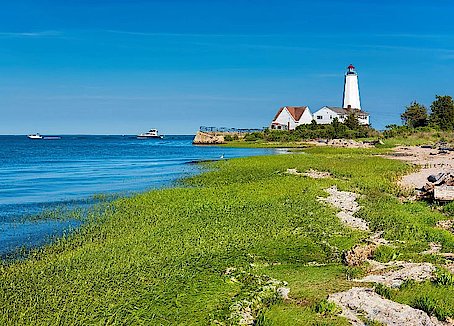
STORRS, CT, May 20, 2024 – Sustainable CT, a voluntary certification program to recognize thriving and resilient Connecticut municipalities, is proud to announce the certification achievements of eleven towns for their exceptional commitment to sustainability.
Gold Certification Recipient:
Old Saybrook
Achieving the highest level of certification, Old Saybrook has showcased extraordinary leadership and innovation in sustainability. Their Gold certification recognizes comprehensive and effective sustainability strategies that serve as a model for other municipalities.
Silver Certification Recipient:
East Haddam
East Haddam's Silver certification reflects their advanced initiatives in sustainable practices and community engagement. This achievement highlights their proactive approach to sustainability.
Bronze Certification Recipients:
Barkhamsted
Colchester
Durham
Ellington
Groton
Haddam
Marlborough
Thomaston
These eight towns have demonstrated significant achievements across a range of sustainability actions, including environmental stewardship, public health, and social equity. Their Bronze certification is a testament to their dedication and collaborative efforts towards creating vibrant and sustainable communities.
Climate Leader Designation:
Branford
Old Saybrook
The Climate Leader designation is awarded to municipalities that demonstrate outstanding leadership in addressing climate change through reducing greenhouse gas emissions and implementing climate resilience strategies. Both Branford and Old Saybrook have set a high standard for climate action and serve as exemplary leaders in the state.
"We are thrilled to celebrate these towns for their impressive achievements," said Lynn Stoddard, executive director of Sustainable CT. "Their certifications and climate leadership exemplify the dedication and innovative spirit that are essential for building a sustainable future. We congratulate each community for their hard work and commitment to making Connecticut a better place to live, work, and visit. And we are particularly proud of Old Saybrook for their outstanding work in achieving Gold certification with the highest point total in our program’s history."
Sustainable CT certifications are awarded based on the completion of a broad range of sustainability actions, from community building and thriving local economies to vibrant arts and culture and environmental stewardship. Municipalities must demonstrate significant achievements across twelve impact areas to qualify for certification. The Climate Leader designation recognizes municipalities that have completed rigorous actions to address climate change and have committed to ongoing efforts to reduce greenhouse gas emissions and adapt to the changing climate.
Certification is effective for three years, during which time the towns can continue to implement and build upon their sustainability initiatives. Sustainable CT provides a detailed framework and support for municipalities striving to enhance their sustainability and community well-being.
All these towns will be recognized at Sustainable CT’s “Spring into Summer 2024” event on June 11 at Wickham Park in Manchester. The official annual awards ceremony for these and other towns that earn certification and Climate Leader designation during 2024 will be held in the Fall.
For more information about Sustainable CT and the certification process, please visit sustainablect.org.
Sustainable CT is independently funded, with strong multi-year support from the Emily Hall Tremaine Foundation, Hampshire Foundation, Common Sense Fund, Connecticut Green Bank, and the Community Foundation of Eastern Connecticut.
About Sustainable CT
Sustainable CT is a free, voluntary certification program that supports and recognizes thriving and resilient Connecticut municipalities. An independently funded, grassroots, municipal effort, the program provides a comprehensive menu of sustainability best practices, technical assistance, and funding to implement them, and recognition of town accomplishments through certification. Sustainable CT is designed to support all Connecticut municipalities, regardless of size, geography, or resources, and empowers municipalities to create high collective impact for current and future residents.
Contact:
Jim Hunt, Communications Manager
Sustainable CT
860-259-4732
[email protected]
Sustainable CT Surpasses $4 Million Community Investment Milestone Through Community Match Fund Program
STORRS, CT, April 30, 2024 – Sustainable CT, a statewide program that inspires, supports, and celebrates municipal initiatives that build more welcoming and climate-friendly communities for all, proudly announces a significant milestone in community investment. Through its innovative Community Match Fund program, Sustainable CT has surpassed $4 million in funds directly invested in community-led projects across the state.
The Community Match Fund program is a cornerstone of Sustainable CT's mission to empower communities to implement local sustainability projects. The program provides matching funds to support a wide range of sustainability initiatives, including natural resource protection, clean and renewable energy, climate resilience, food waste diversion and composting, arts and culture, public transportation, sustainable food networks, and programs promoting social justice and equity.
Since its inception in 2019, the Sustainable CT Community Match Fund has invested in over 300 local projects throughout the state of Connecticut.
"We are thrilled to announce that Sustainable CT has surpassed $4 million in community investment through our Community Match Fund program," said Lynn Stoddard, executive director of Sustainable CT. "This milestone is a testament to the dedication and creativity of communities across Connecticut in advancing sustainability and making positive change happen at the local level."
The Community Match Fund leverages Sustainable CT funding alongside community investment in the form of individual, small-dollar donations to local projects. Each project runs a public crowdfunding campaign through Patronicity.com/sustainablect to engage the community and secure half the funding needed to complete its work.
Sustainable CT then matches every dollar raised. To date, Sustainable CT has committed nearly $1.9 million as a match to more than $2.1 million collected from 21,000 individual donations.
“The Sustainable CT team was available, instructive, responsive, encouraging and supportive,” said Robert Lyons with the Indaba Action Team, a racism awareness campaign based in Clinton, Connecticut. With the support of Sustainable CT, Indaba recently produced the critically acclaimed one act play Death by A Thousand Cuts: A Requiem for Black and Brown Men at the Andrews Memorial Hall Stage in Clinton.
“We exceeded the target number of donors to activate the matching grant,” explained Lyons, “and, with the match, raised the full amount of the funds needed to cover all expenses. It was all accomplished smoothly and without surprises. We are grateful to Sustainable CT for supporting us through their clear process in such a steadfast way.”
This unique approach not only amplifies local investment, but also fosters involvement, ownership, and pride among residents as they work together to bring their sustainability visions to life.
"We are continually inspired by the creativity and commitment demonstrated by communities across Connecticut," said Inez Ortiz, program assistant at Sustainable CT. "The success of the Community Match Fund program underscores the power of collective action in driving positive change, and we look forward to continuing to support and celebrate the impactful projects being implemented by a large and diverse group of community leaders all across the state."
Unlike most traditional grant programs, the Community Match Fund is open to anyone. Project leaders don’t need the backing of a formal organization, there is no application to submit, no deadlines, and no subjective review and scoring process. Anyone who has an idea for a public project is welcome to reach out to Sustainable CT at any time, and if their work aligns with that of Sustainable CT, they will quickly be approved and moved forward.
The Community Match Fund continues to accept and support new projects on a rolling basis. Anyone with an idea for a public, sustainability-related initiative is encouraged to contact Sustainable CT at [email protected].
Sustainable CT is independently funded, and the Community Match Fund is supported by the Hampshire Foundation, the Emily Hall Tremaine Foundation, Connecticut Green Bank, and Supporting Organizing Work CT.
About Sustainable CT
Sustainable CT is a free, voluntary certification program that supports and recognizes thriving and resilient Connecticut municipalities. An independently funded, grassroots, municipal effort, the program provides a comprehensive menu of sustainability best practices, technical assistance, and funding to implement them, and recognition of town accomplishments through certification. Sustainable CT is designed to support all Connecticut municipalities, regardless of size, geography, or resources, and empowers municipalities to create high collective impact for current and future residents.
Contact:
Jim Hunt, Communications Manager
Sustainable CT
860-259-4732
[email protected]
Sustainable CT Hosts Online Earth Month Event
Featuring Brenda Mallory, Chair of White House Council
on Environmental Quality, Congresswoman Jahana Hayes,
and Senator Richard Blumenthal

STORRS, CT, April 15, 2024 - Sustainable CT, a prominent statewide initiative dedicated to fostering sustainable communities, is thrilled to announce a special online Earth Month event. Scheduled for April 30, 2024, at noon, the event will feature Brenda Mallory, Chair of the White House Council on Environmental Quality, alongside Congresswoman Jahana Hayes (CT-5), and Senator Richard Blumenthal. The event aims to amplify the conversation around sustainable practices and environmental stewardship, offering insights from three esteemed leaders in the field.
Brenda Mallory, a distinguished environmental policy expert and advocate, currently serves as the Chair of the White House Council on Environmental Quality. With a robust background in environmental law and policy, Mallory brings a wealth of knowledge and experience to her position. Registrants to the event will have the opportunity to submit questions about the Biden-Harris administration's approach to improving, preserving, and protecting America’s public health and environment.
Joining Mallory will be Congresswoman Jahana Hayes and Senator Richard Blumenthal. As passionate advocates for sustainability and environmental justice, Congresswoman Hayes and Senator Blumenthal have been driving forces in promoting green initiatives and policies at the federal level. Their perspectives on the intersection of environmental concerns and community well-being will enrich the discussion.
"We are honored to welcome Chair Mallory, Congresswoman Hayes, and Senator Blumenthal to our special online event as part of this month's Earth Day celebrations" said Lynn Stoddard, executive director of Sustainable CT. "Their leadership and dedication to environmental stewardship serve as inspiration for all of us striving to create positive change. We look forward to an enlightening discussion that will empower Connecticut communities to take meaningful action."
This online event is open to the public and will take place on April 30, 2024, 12:00 – 1:00 p.m. Registration is free, but space is limited. Interested individuals are encouraged to register early.
For more information about the event and Sustainable CT, please visit sustainablect.org.
About Sustainable CT
Sustainable CT is a free, voluntary certification program that supports and recognizes thriving and resilient Connecticut municipalities. An independently funded, grassroots, municipal effort, the program provides a comprehensive menu of sustainability best practices, technical assistance, and funding to implement them, and recognition of town accomplishments through certification. Sustainable CT is designed to support all Connecticut municipalities, regardless of size, geography, or resources, and empowers municipalities to create high collective impact for current and future residents.
Contact:
Jim Hunt, Communications Manager
Sustainable CT
860-259-4732
[email protected]
Sustainable CT Opens Applications for 2024 Fellowship Program
STORRS, CT, January 29, 2024 – Sustainable CT, a prominent statewide initiative dedicated to fostering sustainable communities, is now accepting applications for its highly esteemed 2024 Fellowship Program.
The Sustainable CT Fellowship Program recognizes and honors individuals who display extraordinary dedication and commitment to advancing sustainability practices throughout the state. It offers a unique opportunity for highly qualified college students to collaborate closely with municipalities and regional organizations on a range of sustainability projects. Placing fellows within the state's Councils of Governments (COGs), Connecticut's regional planning organizations, the program facilitates collaboration between fellows and cities and towns, leveraging Sustainable CT's no-cost resources for the implementation of sustainable initiatives.
Fellows participating in the program gain valuable experience in a professional setting, directly engaging with innovative sustainability initiatives, local government operations, and regional coordination. Past Sustainable CT fellows have transitioned to internships at the Connecticut General Assembly, pursued advanced degrees, been employed as regional planners at COGs and Sustainable CT partner organizations, worked for the towns they initially supported as fellows, and even been hired by Sustainable CT.
Sustainable CT is actively seeking a diverse group of talented individuals who are passionate about sustainability and committed to effecting positive change. Fellows will work collaboratively with local governments and community partners to develop and implement sustainable practices and policies. Their responsibilities will encompass research, data analysis, community outreach, and project management to drive tangible outcomes contributing to Connecticut's sustainable future.
Lynn Stoddard, executive director of Sustainable CT, expressed enthusiasm about providing this exceptional opportunity to Connecticut students. Stoddard stated, "The fellows gain immeasurably from the experience, and the COGs and towns they work with in the program benefit immensely, too. It really is a win-win for everyone involved, and an even greater win for the advancement of sustainability in Connecticut."
This paid fellowship program entails up to 40 hours per week from late May through late August. Interested candidates can find more information and application instructions on the Sustainable CT Fellowship webpage. Applicants must be enrolled in a post-secondary degree program or have graduated in the most recent academic year (2023-2024). They must either be enrolled in a Connecticut college or university or be a permanent resident of the state. All academic majors will be considered. Applications are due by 5:00 p.m. EST on February 19, 2024, and Sustainable CT will notify selected candidates by early April 2024.
The Sustainable CT Fellowship Program is made possible by the generous support of the Hampshire Foundation, Connecticut Green Bank, the Community Foundation of Middlesex County, the Community Foundation for Greater New Haven, Fairfield County’s Community Foundation, the Valley Community Foundation, New Canaan Community Foundation, and Main Street Community Foundation. The commitment of these organizations to sustainability and community empowerment is instrumental in driving positive change across Connecticut.
About Sustainable CT
Sustainable CT is a free, voluntary certification program that supports and recognizes thriving and resilient Connecticut municipalities. An independently funded, grassroots, municipal effort, the program provides a comprehensive menu of sustainability best practices, technical assistance, and funding to implement them, and recognition of town accomplishments through certification. Sustainable CT is designed to support all Connecticut municipalities, regardless of size, geography, or resources, and empowers municipalities to create high collective impact for current and future residents.
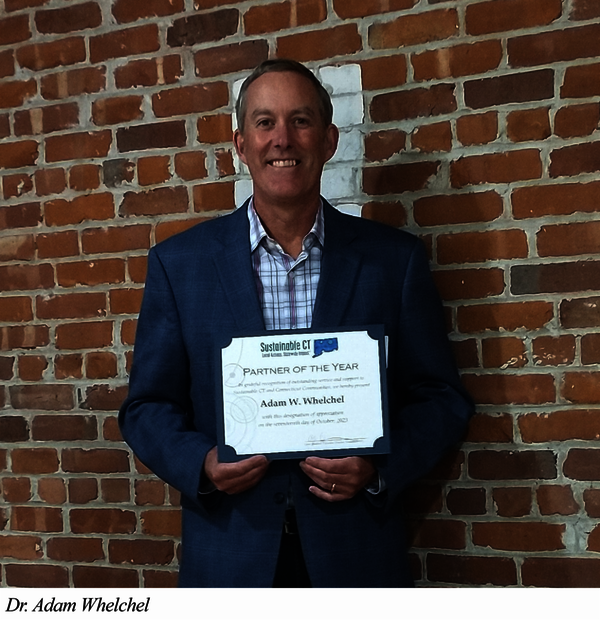
Sustainable CT Recognizes Adam Whelchel of The Nature Conservancy as Partner of the Year at Awards Ceremony
STORRS, CT, October 20, 2023 – Sustainable CT, a statewide, voluntary certification program that supports sustainability best practices in Connecticut municipalities, named Adam Whelchel, director of science for The Nature Conservancy Connecticut Chapter, their Partner of the Year at the 2023 Sustainable CT Awards Celebration for his efforts in organizing and hosting Community Resilience Building (CRB) workshops across the state.
Sustainable CT held its annual awards celebration at the American Mural Project in Winsted on October 17th. 16 Connecticut municipalities were also honored at the event for achieving Bronze, Silver, or Gold level certification in the Sustainable CT program, and six towns were designated “Climate Leaders” for their actions to reduce greenhouse gas emissions and adapt to the changing climate.
“We are so very proud to be recognized with this prestigious award by our long-standing partner Sustainable CT,” said Whelchel. “The Community Resilience Building work we have advanced hand in hand with Sustainable CT is truly making the places we call home more resilient, sustainable, and equitable.”
Adam Whelchel has been a Sustainable CT partner since 2017, first serving as a working group member designing the first suite of actions that would be integrated into the Sustainable CT certification program. Since 2018, he and the Connecticut Chapter of the Nature Conservancy have provided any municipality registered with Sustainable CT – currently numbering 131 of Connecticut’s 169 incorporated towns – the opportunity to participate in CRB workshops at no-cost.
The CRB process is ideally suited to constructively and collaboratively enable communities to locate, assess, and prioritize impacts and solutions to climate change and natural hazards affecting infrastructure, community, and the environment.
“We want to thank the staff at Sustainable CT and especially Adam and the Nature Conservancy for the assistance provided to the City of Torrington in identifying our resilience strengths and weaknesses,” said Jeremy Leifert, city planner of Torrington. “The thoughtful guidance to our core team and workshop participants helped provide us with the tools and actions to move our community toward a more resilient future.”
John Olin of the East Haddam Conservation Commission and chair of the Resilience Subcommittee added, “I’m particularly thankful for Adam’s encouragement and flexibility in the planning phase of the CRB workshop. Bringing the local community together seemed daunting at first, so Adam’s relaxed and efficient leadership was particularly helpful. Everyone agreed that the workshop was a great success, and from this beginning a regular meeting of local leaders has evolved to meet resilience challenges."
Throughout his partnership with Sustainable CT, Whelchel has shown a deep commitment and a passion for helping communities identify and address their vulnerabilities to climate change. Whelchel assumes the lion’s share of the work facilitating these events by organizing pre-workshop preparation materials, hosting the event, and generating an after-workshop Summary of Findings Report. Municipalities that participate in these workshops can use the Summary of Findings Report as part of their application package to earn points toward certification in the Sustainable CT program.
“Sustainable CT is deeply grateful for Adam's work and our strong partnership with The Nature Conservancy,” said Lynn Stoddard, executive director of Sustainable CT. “We are proud to recognize Adam Whelchel as our Partner of the Year for his dedication to helping communities prepare for the very real impacts we are experiencing from climate change. The preparedness actions that towns take as a result of this important work will not only make our communities more resilient, but they will help save lives, money, and enhance community well-being.”
The Community Resilience Building process has been used by over 450 communities across twelve states including Connecticut, Massachusetts, Rhode Island, and New York to help local governments understand their unique challenges under current and future climate projections and natural disasters. In addition, the process helps communities effectively and efficiently create resilience action plans specifically tailored to meet local needs. Connecticut communities interested in participating in a Community Resilience Building process should contact Sustainable CT at [email protected].
Sustainable CT is independently funded, with strong multi-year support from the Emily Hall Tremaine Foundation, Hampshire Foundation, Common Sense Fund, Connecticut Green Bank, and the Community Foundation of Eastern Connecticut.
For more information, visit sustainablect.org.
About Sustainable CT
Sustainable CT is a free, voluntary certification program that supports and recognizes thriving and resilient Connecticut municipalities. An independently funded, grassroots, municipal effort, the program provides a comprehensive menu of sustainability best practices, technical assistance, and funding to implement them, and recognition of town accomplishments through certification. The Community Match Fund provides funding to support community-led sustainability projects and has resulted in the investment of over $3.5 million in over 300 projects throughout Connecticut. Sustainable CT is designed to support all Connecticut municipalities, regardless of size, geography, or resources and empowers municipalities to create high collective impact for current and future residents.
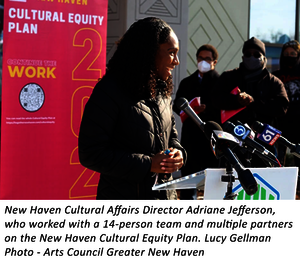
16 Connecticut Communities Earn Prestigious Sustainable CT Certification, Six Recognized as Climate Leaders
New Haven is the first to receive Gold level certification
STORRS, CT, October 2, 2023 – Sustainable CT, a statewide, voluntary certification program that supports sustainability best practices in Connecticut municipalities, announced the 2023 cohort of Connecticut communities to earn Sustainable CT certification, including the first municipality to earn Gold certification, and those communities honored as Climate Leaders.
Sustainable CT is thrilled to announce the City of New Haven as the first recipient of Gold certification. The city earned over 1,000 points towards certification and was nominated for 18 “success story” awards. These success stories include the creation of New Haven’s Cultural Equity Plan and the Homeless Navigation Hub Continuum.
Gold certification requires municipalities to show a deep commitment to equity, collaborate effectively with other municipalities, and achieve Climate Leader Designation. New Haven’s landmark certification embodies these requirements and highlights the value of municipal collaboration, both inter-departmentally and with residents, to create more equitable and climate resilient communities.
Sustainable CT is also excited to announce that the following towns have earned Silver certification this year: Bristol, Chester, Hamden, Middletown, and Old Saybrook. Sustainable CT also applauds Bolton, Branford, Clinton, Granby, Marlborough, Montville, Stonington, Trumbull, Winchester, and Windham for achieving Bronze certification.
This year, seven municipalities earned their first certification in the program. Branford, Clinton, Granby, Marlborough, Montville, and Winchester achieved bronze certification for the first time, with Hamden earning Silver. With the addition of first time-certified towns each year, eighty-three of Connecticut’s one-hundred sixty-nine municipalities have earned a Sustainable CT certification during the program’s six-year history. Currently, sixty-eight towns are certified, representing nearly 60% of the state’s population.
Sustainable CT congratulates Guilford, Hartford, Litchfield, Manchester, New Haven, and Portland for each earning Climate Leader Designation. This designation celebrates municipalities that have successfully implemented numerous climate actions to reduce greenhouse gas emissions and increase resiliency to adapt to the changing climate.
“Congratulations to our newest cohort of Sustainable CT certified municipalities and Climate Leaders,” said Lynn Stoddard, executive director of Sustainable CT. “It has been wonderful to see the excitement around our first year offering Gold certification and we congratulate New Haven on becoming the first municipality to achieve this special distinction. In addition, each certification cycle it is heartening to see so many elected officials, town staff members, and volunteers striving to make their communities more equitable, resilient, and prosperous, and using our action road map as a guide.”
To earn any level of certification in the program, a town must complete at least one action in each of twelve categories encompassing a broad range of sustainability topics as well as complete at least one equity toolkit in the action “Optimize for Equity.” The toolkit provides a structure and process for relationship building and gathering input from stakeholders that are often not present in the municipal decision-making process. The town’s certification level is then determined based on the number of points earned by completing sustainability actions. This model allows municipalities of any size to choose sustainability actions that are most impactful for their community, while continuing to foster more resilient and inclusive places to live for residents.
Sustainable CT will be recognizing and celebrating all 2023 certified municipalities and Climate Leaders at its 2023 Awards Celebration. The event will be held at the site of the American Mural Project, the largest indoor collaborative piece of artwork in the world, in Winsted (Winchester), Connecticut on October 17th from 4-7 p.m.
Sustainable CT is independently funded, with strong multi-year support from the Emily Hall Tremaine Foundation, Hampshire Foundation, Common Sense Fund, Connecticut Green Bank, and the Community Foundation of Eastern Connecticut.
For more information about Sustainable CT, please visit sustainablect.org.
About Sustainable CT
Sustainable CT is a free, voluntary certification program that supports and recognizes thriving and resilient Connecticut municipalities. An independently funded, grassroots, municipal effort, the program provides a comprehensive menu of sustainability best practices, technical assistance, and funding to implement them, and recognition of town accomplishments through certification. The Community Match Fund provides funding to support community-led sustainability projects and has resulted in the investment of over $3.5 million in over 300 projects throughout Connecticut. Sustainable CT is designed to support all Connecticut municipalities, regardless of size, geography, or resources and empowers municipalities to create high collective impact for current and future residents.

Sustainable CT 2023 Awards Celebration to be Held at American Mural Project Site
Certified CT Municipalities to be Honored October 17, 4-7 p.m.
STORRS, CT, August 21, 2023 – Sustainable CT, a statewide, voluntary certification program that supports sustainability best practices in Connecticut municipalities, announced that their 2023 Awards Celebration will be held at the site of the American Mural Project in Winsted (Winchester) Connecticut on October 17th from 4-7 p.m.
The Sustainable CT Awards Celebration honors municipalities that have achieved bronze, silver, or gold certification, or Climate Leader Designation during Sustainable CT’s spring and fall certification cycles. This year, the event will be held at the site of the American Mural Project, located at 90 Whiting Street, Winsted, in the Town of Winchester, a town that achieved bronze level certification in the spring of 2023.
The largest indoor collaborative piece of artwork in the world, the American Mural Project is a three-dimensional mural spanning 120 feet in length and five stories in height. Serving as a pictorial chronicle, the mural portrays a diverse spectrum of laborers who have enriched American society and culture over the past century, and is a celebration of ingenuity, productivity, and inclusiveness.
The project was first conceived by American artist, photographer and designer Ellen Griesedieck in 1999, and each figure displayed on the mural depicts a real person she met while creating the piece. A former mill building in Winsted was purchased in 2006 to house the work and underwent extensive renovations supported by a federal brown fields grant and matching funds from the State of Connecticut. Additional renovations to a companion building are intended to provide flexible program and retail space, a café and theater.
The American Mural Project’s values and mission closely align to those of Sustainable CT, especially around collaboration and inclusion. Lynn Stoddard, executive director of Sustainable CT says, "The American Mural Project is an inspiring new museum that celebrates community, inclusivity, and the contributions of many individuals who have helped shape the culture and vibrancy of Connecticut and our nation. We’re excited to hold our 2023 Awards Celebration in Winchester, one of the towns that earned certification this year."
Amy Wynn, executive director of the American Mural Project added, "The Sustainable CT event so greatly aligns with the American Mural Project's values that revolve around community collaboration. Ellen Griesedieck's vision for the American Mural Project wouldn't have been able to take root and grow if it weren't for collaboration with a vast and growing community, and Sustainable CT nurtures that approach as well."
The 2023 Sustainable CT Awards Celebration is free and open to the public. Those wishing to attend should register early as space is limited. The event is generously supported by Energy Source and Casella Waste Systems. Sponsorship opportunities are available; call 860-259-4729 for information.
Sustainable CT is independently funded, with strong multi-year support from the Emily Hall Tremaine Foundation, the Hampshire Foundation, Connecticut Green Bank, the Common Sense Fund, and the Community Foundation of Eastern Connecticut.
About Sustainable CT
Sustainable CT is a free, voluntary certification program that supports and recognizes thriving and resilient Connecticut municipalities. An independently funded, grassroots, municipal effort, Sustainable CT provides a wide-ranging menu of best practices. Municipalities choose Sustainable CT actions, implement them, and earn points toward certification.
Sustainable CT also provides opportunities for grant funding through its Community Match Fund program to help communities promote economic well-being and enhance equity, all while respecting the finite capacity of the natural environment. The program is designed to support all Connecticut municipalities, regardless of size, geography, or resources. Sustainable CT empowers municipalities to create high collective impact for current and future residents.
Sustainable CT Fellows Collaborate to Drive Climate Action Planning Statewide
STORRS, CT, July 20, 2023 – Sustainable CT, a statewide program that supports municipal sustainability initiatives, announced that its 2023 cohort of Sustainable CT Fellows are currently working on developing strategies and materials for an extensive outreach campaign to support the implementation of EPA-funded Climate Action Plans across the state.
The State of Connecticut and Councils of Governments (COGs) are in the early planning stages of developing Climate Action Plans for the state and four metropolitan areas, including the Fairfield, New Haven, and Hartford area, as well as the Worcester, Massachusetts area, which covers portions of northeastern Connecticut. The Sustainable CT Fellows are working with the COGs in support of the metropolitan area plans.
Climate Action Planning is made possible with the support of the Environmental Protection Agency’s Climate Pollution Reduction Grants (CPRG) program. The CPRG program is funded by the Inflation Reduction Act and provides $5 billion in grants to support state and local government efforts to develop and implement plans for reducing air pollution and greenhouse gas emissions.
The first round of plans, known as Priority Climate Action Plans (PCAP), are due in March of 2024. Initial plan development began this summer, and Sustainable CT Fellows are working together to help lay the groundwork now for effective future outreach, the feedback from which will inform the plan development and implementation process.
Katie Meder, working with the South Central Regional Council of Governments, is just one of many Sustainable CT Fellows working to develop outreach strategies and materials. “I am really enjoying working with the other fellows across the state,” says Meder, “because it gives the project a more personalized feel. I'm looking forward to seeing all the materials we develop together, as a team.”
The outreach strategy and materials development being undertaken by Sustainable CT Fellows focuses on equity and volume, with an intention to capture input from populations and voices that are often missed in traditional planning processes. The current strategy is to develop a variety of outreach materials in various media formats such as flyers, video, messaging, social media, public events, and educational content.
Morgan Casey, a fellow at the Southeastern Connecticut Council of Governments, is working to develop content for different social media platforms. "Social media is an important part of climate outreach, as it brings together young and diverse audiences with different interests,” says Casey. “Information can circulate faster, and more voices can be heard, which is something the COGs want to focus on with CPRG outreach."
Michael Towle, Deputy Director for the Western Connecticut Council of Governments, anticipates valuable results from the Sustainable CT Fellows, stating, “The COGs are looking forward to utilizing the resources developed this summer through Sustainable CT for their Climate Action Plans.”
Sustainable CT Fellows are working with COGs on the CPRG program throughout the summer, and future cohorts of fellows will continue to support the program in various capacities. Sustainable CT would like to thank the Connecticut Councils of Governments for hosting and guiding their fellows in their support of this project.
The Sustainable CT Fellowship Program is made possible by the generous support of the Hampshire Foundation, Connecticut Green Bank, the Community Foundation of Middlesex County, the Community Foundation of Greater New Britain, Fairfield County’s Community Foundation, the Valley Community Foundation, and the New Canaan Community Foundation. The commitment of these organizations to sustainability and community empowerment is instrumental in driving positive change across Connecticut.
About Sustainable CT
Sustainable CT is a free, voluntary certification program that supports and recognizes thriving and resilient Connecticut municipalities. An independently funded, grassroots, municipal effort, Sustainable CT provides a wide-ranging menu of best practices. Municipalities choose Sustainable CT actions, implement them, and earn points toward certification.
Sustainable CT also provides opportunities for grant funding through its Community Match Fund program to help communities promote economic well-being and enhance equity, all while respecting the finite capacity of the natural environment. The program is designed to support all Connecticut municipalities, regardless of size, geography, or resources. Sustainable CT empowers municipalities to create high collective impact for current and future residents.
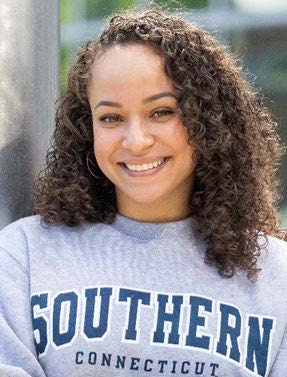
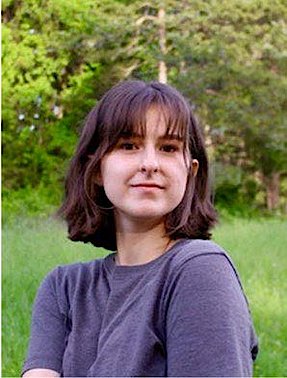
Sustainable CT Welcomes Two New Project Assistants
STORRS, CT, June 3, 2023 – Sustainable CT, a leading statewide initiative in promoting community-level sustainability, is pleased to announce the addition of two talented project assistants to its team. This strategic expansion aims to bolster the organization's efforts in advancing sustainable practices across Connecticut.
The new project assistants, Inez Ortiz and Dorothy Piszczek, bring a wealth of expertise and a passion for sustainability to their roles. With their diverse backgrounds and skills, they are well-equipped to contribute to Sustainable CT's mission of fostering vibrant, resilient, and equitable communities.
Inez graduated from Southern Connecticut State University in 2023 with a bachelor’s degree in science, majoring in environmental systems and sustainability science with a concentration in environmental policy. During her time at SCSU, Inez achieved a Sustainability Leadership Certificate, helped create and publish an interactive map of sustainable infrastructure on campus, and conducted research on the effectiveness of carbon pricing policies in reducing international greenhouse gas emissions. Her passion for sustainability science and environmental policy led her to an internship at the Connecticut Department of Energy and Environmental Protection from the fall of 2022 to the spring of 2023.
Dorothy graduated from the University of Connecticut with a bachelor’s degree in ecology and evolutionary biology and psychological sciences. During her time at UConn, she served as president of the Avery Point Eco Husky Club and conducted a sustainability review of the Avery Point Campus. Dorothy has worked and volunteered in several communities, including as a site lead at an education non-profit in Washington, DC and as an AmeriCorps NCCC volunteer.
Sustainable CT's executive director, Lynn Stoddard, expressed excitement about the new additions,
stating, "We are thrilled to welcome Inez and Dorothy to Sustainable CT. Their dedication to sustainability and community engagement aligns perfectly with our mission. We’re confident they will help us accelerate the adoption of sustainable practices throughout Connecticut."
As project assistants, Ortiz and Piszczek will support and collaborate with Sustainable CT's existing staff and partners to provide technical assistance, facilitate workshops and training sessions, conduct research, and support the development and implementation of sustainability projects. Sustainable CT is a voluntary certification program that recognizes and supports Connecticut municipalities in becoming more sustainable, inclusive, and resilient. The initiative provides a roadmap, resources, and technical support to help communities take meaningful actions in areas such as clean energy, land use, transportation, and equity.
Sustainable CT's continued growth and impact would not be possible without the support and collaboration of its partners, funders, and the Connecticut community. Sustainable CT is an
independently funded organization and receives strong multi-year support from the Emily Hall Tremaine Foundation, Hampshire Foundation, Connecticut Green Bank, Common Sense Fund, and the Community Foundation of Eastern Connecticut. For more information, visit sustainablect.org.
About Sustainable CT
Sustainable CT is a voluntary certification program to recognize thriving and resilient Connecticut municipalities. An independently funded, grassroots, municipal effort, Sustainable CT provides a wide‐ranging menu of best practices. Municipalities choose Sustainable CT actions, implement them, and earn points toward certification.
Sustainable CT also provides opportunities for grant funding through its Community Match Fund program to help communities promote economic well‐being and enhance equity, all while respecting the finite capacity of the natural environment. The program is designed to support all Connecticut municipalities, regardless of size, geography, or resources. Sustainable CT empowers municipalities to create high collective impact for current and future residents.
Connecticut Communities Recognized for Certification and Climate Leader Designation
Bronze Certified: Montville and Winchester
Climate Leader: Guilford, Litchfield, New Haven and Portland
STORRS, CT, June 5, 2023 – Sustainable CT, the statewide initiative that supports and recognizes Connecticut municipalities for their sustainability efforts, proudly announces the recent accomplishments of several towns across the state. Montville and Winchester have achieved Bronze certification, demonstrating their commitment to advancing sustainability practices within their communities. Additionally, Guilford, Litchfield, New Haven, and Portland have been awarded the prestigious Climate Leader designation for their exceptional leadership in addressing climate change and fostering resilience. The Bronze certification received by Montville and Winchester underscores their dedication to sustainable development and the well-being of their residents. By implementing sustainable practices in various areas such as energy, transportation, waste management, and community engagement, these towns have made substantial progress in building a more sustainable future. Montville and Winchester qualified for certification during Sustainable CT’s 2023spring submission cycle.
In addition, the Climate Leader designation is a testament to the exemplary leadership shown by Guilford, Litchfield, New Haven, and Portland in combatting climate change. These towns have implemented innovative strategies and initiatives to reduce greenhouse gas emissions, enhance climate resilience, and promote sustainability. Their efforts encompass a broad spectrum of activities such as community engagement, green infrastructure development, clean energy adoption, and climate adaptation planning.
Municipal sustainability teams play a crucial role in achieving progress in sustainability according to Denise Raap, Litchfield first selectman. "The Town of Litchfield is so proud of our Sustainable Litchfield Team!” Raap said. “This dynamic group of dedicated environmental leaders has embraced and followed through with the actions that support the town's goals of Climate Leader in Connecticut. They have prepared Litchfield to be more resilient, less reliant on fossil fuels and environmentally attentive to the issues that we confront in the face climate change. We look forward to working with Sustainable CT in our next achievement of Gold status."
"We are incredibly proud of Montville and Winchester for achieving Bronze certification and Guilford, Litchfield, New Haven, and Portland for their Climate Leader designation," said Lynn Stoddard, executive director of Sustainable CT. "Their commitment to sustainable practices and their innovative approaches to addressing climate change are an inspiration to all communities in Connecticut. Together, they are helping to create a more resilient, prosperous, and equitable future for all."
The achievements of Montville and Winchester, along with the Climate Leader designations for Guilford, Litchfield, New Haven, and Portland, will be celebrated at the upcoming Sustainable CT Annual Awards Ceremony in October.
Sustainable CT provides a roadmap for municipalities to achieve sustainability goals through a wide range of actions, including reducing energy consumption, promoting renewable energy, improving transportation systems, conserving land and water resources, and fostering inclusive and vibrant communities. The program is designed to support communities as they implement sustainability practices and provides technical assistance, funding opportunities, and recognition for their achievements.
Sustainable CT is independently funded, with strong multi-year support from the Emily Hall Tremaine Foundation, Hampshire Foundation, Connecticut Green Bank, Common Sense Fund, and the Community Foundation of Eastern Connecticut.
For more information about Sustainable CT and its certification program, please visit www.sustainablect.org.
About Sustainable CT
Sustainable CT is a voluntary certification program to recognize thriving and resilient Connecticut municipalities. An independently funded, grassroots, municipal effort, Sustainable CT provides a wide‐ranging menu of best practices. Municipalities choose Sustainable CT actions, implement them, and earn points toward certification.
Sustainable CT also provides opportunities for grant funding through its Community Match Fund program to help communities promote economic well‐being and enhance equity, all while respecting the finite capacity of the natural environment. The program is designed to support all Connecticut municipalities, regardless of size, geography, or resources. Sustainable CT empowers municipalities to create high collective impact for current and future residents.
Sustainable CT Announces 2023 Fellowship Program Participants
STORRS, CT, May 23, 2023 – Sustainable CT, a leading statewide initiative in Connecticut aimed at inspiring and supporting communities in becoming more sustainable, is thrilled to announce the participants in its 2023 Fellowship Program. This esteemed fellowship program recognizes and supports individuals who demonstrate exceptional dedication and commitment to advancing sustainability practices across the state.
After a rigorous selection process, the 2023 Sustainable CT Fellowship has been awarded to eleven outstanding college students from diverse backgrounds across Connecticut.
The Sustainable CT Fellowship program provides an exceptional opportunity for highly qualified young people to work closely with municipalities and regional organizations on various sustainability projects. The Fellowship Program places fellows across the state’s Councils of Governments (COGs), Connecticut’s regional planning organizations, to help cities and towns understand and use Sustainable CT's many no-cost resources and collaborate on the implementation of sustainability initiatives.
Fellows gain valuable experience working within a professional setting and are directly engaged with innovative sustainability initiatives, local government operations, and regional coordination and operation. Sustainable CT fellows have gone on to intern at the Connecticut General Assembly, pursued advanced degrees, worked at the COGs as regional planners and at Sustainable CT partner organizations, and they’ve even worked for towns that they once supported as fellows.
The selected fellows for the 2023 cohort are a group of talented individuals with a passion for sustainability and a commitment to making positive change. They bring a wide range of backgrounds, skills, and perspectives to address the unique challenges faced by municipalities in Connecticut. They include:
Lillian Adamo – a rising senior at the University of Connecticut. She is majoring in environmental science and political science. She will be working with the Western CT Council of Government in Sandy Hook.
Cole Burnham – a rising first-year graduate student at Tufts University studying urban and environmental policy and planning. He will be working with the Naugatuck Valley Council of Governments in Waterbury.
Morgan Casey – a rising junior at Central Connecticut State University studying international studies with a minor in French. She will be working at the Southeastern CT Council of Governments in Norwich this summer.
Adrian Huq – a rising senior at Tufts University in Massachusetts majoring in applied environmental studies and minoring in film and media studies. This summer, they will be working at the Capitol Region Council of Governments in Hartford.
Nicolas Lombardo – Nicolas is earning a dual-degree in applied and resource economics and cognitive science with minors in geographic information science and crime and justice at the University of Connecticut. This summer, he will be working with the Western Council of Governments in Sandy Hook.
Puji Masireddy – a rising sophomore at Wesleyan University, majoring in economics with a minor in data analysis. This summer, Puji will be based at the Capital Region Council of Governments in Hartford.
Katie Meder – a rising Junior at Wheaton College in Massachusetts. She is majoring in environmental science with a biology concentration and is minoring in environmental studies and urban studies. She will be working at the South Central Regional Council of Governments in North Haven.
Summer Mitchell – a rising senior at the University of Connecticut majoring in environmental science. Summer is excited to be working at the Lower Connecticut Valley River Council of Governments in Essex.
Dylan Steer – a rising Junior at the University of Connecticut majoring in environmental studies and political science. He will be working at the Connecticut Metropolitan Council of Governments in Bridgeport.
Devin Sturtevant – a rising junior at Wesleyan University majoring in science in society. This summer, she will be working with the Lower Connecticut River Valley Council of Governments in Essex.
Ryan Ziemnicki – a member of the class of 2023 at Westfield State University. He is majoring in environmental studies with a minor in sustainable studies and geography. This summer, Ryan will be working with the Northwest Hills Council of Governments in Goshen.
Throughout the fellowship, these emerging leaders will collaborate with local governments and community partners to develop and implement sustainable practices and policies. They will engage in research, data analysis, community outreach, and project management to drive tangible outcomes that contribute to Connecticut's sustainable future.
"We are delighted to announce the recipients of the 2023 Sustainable CT Fellowship Program," said Lynn Stoddard, executive director of Sustainable CT. "These individuals have demonstrated a deep commitment to sustainability, and we are confident that they will inspire others and have a lasting impact on their communities.”
The 2023 Fellows will be formally introduced at Sustainable CT’s “Spring into Summer Celebration” at the Glastonbury Boat House on June 1.
The Sustainable CT Fellowship Program is made possible by the generous support of the Hampshire Foundation, Connecticut Green Bank, the Community Foundation of Middlesex County, the Community Foundation of Greater New Britain, Fairfield County’s Community Foundation, and the Valley Community Foundation. The commitment of these organizations to sustainability and community empowerment is instrumental in driving positive change across Connecticut.
About Sustainable CT
Sustainable CT is a voluntary certification program to recognize thriving and resilient Connecticut municipalities. An independently funded, grassroots, municipal effort, Sustainable CT provides a wide‐ranging menu of best practices. Municipalities choose Sustainable CT actions, implement them, and earn points toward certification.
Sustainable CT also provides opportunities for grant funding through its Community Match Fund program to help communities promote economic well‐being and enhance equity, all while respecting the finite capacity of the natural environment. The program is designed to support all Connecticut municipalities, regardless of size, geography, or resources. Sustainable CT empowers municipalities to create high collective impact for current and future residents.
Sustainable CT Community Match Fund Surpasses $3 Million Investment in Connecticut Communities
Match Fund “1+ Sale” to Boost Composting Projects Community Leadership and Action Conference Scheduled for May 13
STORRS, CT, April 28, 2023 – Sustainable CT, a statewide program that supports municipal initiatives to protect the environment and improve the quality of life for Connecticut residents, has surpassed the $3 million mark in investment in local projects through its Community Match Fund.
Since its inception in September of 2019, the Sustainable CT Community Match Fund has invested in over 250 local projects throughout the state of Connecticut.
The Community Match Fund leverages institutional funding alongside community investment in the form of individual, small-dollar donations to local projects. Each project runs a public crowdfunding campaign to engage the community and secure half the funding needed to complete its work.
Sustainable CT then matches every dollar raised. To date, Sustainable CT has committed $1.4 million as a match to more than $1.6 million collected from over fourteen thousand individual donations.
"Connecticut's communities are leading the way in sustainability, and the Community Match Fund is an integral part of that progress," said Lynn Stoddard, Executive Director of Sustainable CT. "We are thrilled to surpass $3 million in investments and continue to support the work of community leaders and organizations in advancing sustainability and equity in their neighborhoods."
According to Stoddard, the unique method of funding demonstrates important grassroots support for a project. “When neighbors vote with their dollars in support of these projects, they are literally buying in, which creates a sense of community ownership that wouldn’t otherwise exist.”
“Sustainable CT’s Community Match Fund has been an excellent resource in making several of our
Green Jobs projects possible,” said Candace Wright, Executive Director of Solar Youth, Inc., a New Haven-based youth development initiative. “For a small non-profit such as ours, it’s not always easy to secure matching fund opportunities which can be leveraged so quickly to inspire others in the community to give.”
Solar Youth’s Green Jobs Youth Development Program provides high school students from marginalized neighborhoods in New Haven opportunities they might not otherwise have: to learn about the environment, engage in meaningful community improvement projects, connect with peers and adults, attend workshops, and explore their own interests and potential careers.
“We are grateful that Sustainable CT is always so responsive and ensures a pain-free experience in administering the fundraising campaign,” added Wright.
1+ Match Fund Sale
Sustainable CT has also announced a “1+ match fund sale” for the summer. For a limited time, Sustainable CT is boosting its Community Match Fund grants for all food waste diversion and composting projects. For every dollar raised to promote food waste diversion and composting, Sustainable CT will match it, not just dollar-for-dollar, but with a dollar-and-a-half – up to a total project budget of $15,000.
“Project leaders should really take advantage of this,” explained Joseph Dickerson, Sustainable CT’s Community Partnership Manager. “Launch the crowdfunding campaign for your composting project any time between May 13 and August 13, and you’re in – we’ll boost your fundraising dollars for your project 1½ for 1. So, to reach a total project budget goal of $15,000, you only need to raise $6,000 and we’ll provide a $9,000 match. You can boost your project and boost your composting impact this summer.”
Community Leadership and Action Conference
The kickoff of the match fund “1+ sale” coincides with the opening of a series of Community Leadership and Action Conferences being held by Sustainable CT. The first conference, sponsored by Posigen, takes place at the Free Center in Middletown on May 13, and is intended to bring to the Community Match Fund closer to leaders and neighborhoods. Sustainable CT is urging project leaders, activists, visionaries and funders to register to attend to share strategies and ideas to improve the quality of life in the Middletown region. Additional conferences are planned throughout the summer for Hartford, New Haven, Bridgeport, New London and Waterbury.
Across the state, Community Match Fund projects are making towns and cities more inclusive, resilient, and vibrant for all residents. Community members are working together to bring main streets to life with pocket parks, murals, and tree plantings; create green jobs for low-income residents; recycle bikes for people in need of safe, affordable transportation; make public lands productive and beautiful by planting pollinator pathways; educate neighbors on climate solutions; clean up rivers and protect habitats; and create vibrant spaces for everyone to enjoy.
Unlike most traditional grant programs, the Community Match Fund is open to anyone. Project leaders don’t need the backing of a formal organization, there is no application to submit, no deadlines, and no subjective review and scoring process. Anyone who has an idea for a public project is welcome to reach out to Sustainable CT at any time, and if their work aligns with that of Sustainable CT, they will quickly be approved and moved forward.
The Community Match Fund continues to accept and support new projects on a rolling basis. Anyone with an idea for a public, sustainability-related initiative is encouraged to contact Joseph Dickerson at Sustainable CT.
Sustainable CT is independently funded, and the Community Match Fund is supported by the Hampshire Foundation, the Emily Hall Tremaine Foundation, the Connecticut GreenBank, and Supporting Organizing Work CT.
About Sustainable CT
Sustainable CT is a voluntary certification program to recognize thriving and resilient Connecticut municipalities. An independently funded, grassroots, municipal effort, Sustainable CT provides a wide‐ranging menu of best practices. Municipalities choose Sustainable CT actions, implement them, and earn points toward certification.
Sustainable CT also provides opportunities for grant funding through its Community Match Fund program to help communities promote economic well‐being and enhance equity, all while respecting the finite capacity of the natural environment. The program is designed to support all Connecticut municipalities, regardless of size, geography, or resources. Sustainable CT empowers municipalities to create high collective impact for current and future residents.
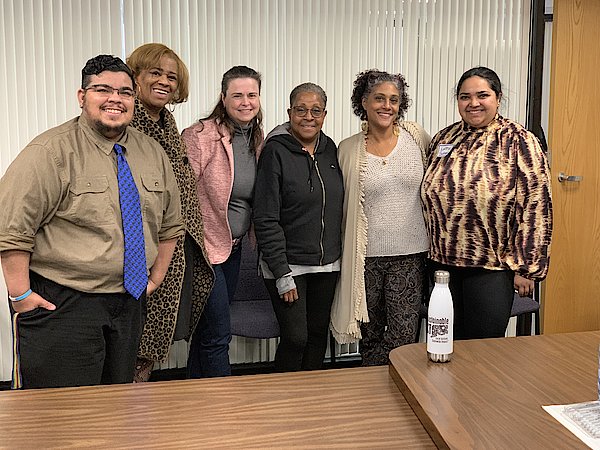
Sustainable CT Hires Six New Equity Coaches to Advance Equity and Inclusion Efforts Across Connecticut
STORRS, CT, March 30, 2023 – Sustainable CT, a statewide initiative that promotes sustainability and equity in communities across Connecticut, has announced the hiring of six new Equity Coaches.
The new Equity Coaches, hired with the generous support of the Emily Hall Tremaine Foundation, will work with Sustainable CT's team to provide guidance, resources, and support to municipalities as they work to implement sustainable and equitable practices. The Equity Coaches will help municipalities identify and address the root causes of environmental and social injustices in their communities, with a focus on historically marginalized and under-served populations.
According to Lynn Stoddard, executive director of Sustainable CT, the new Equity Coaches have joined the organization at a critical time.
“Our Equity Coaches are positioned to assist municipalities with unprecedented funding opportunities now available through Federal grants - for climate mitigation, clean energy, and infrastructure improvements,” said Stoddard, referring to funding available through the 2022 Inflation Reduction Act and the 2021 Bipartisan Infrastructure Law. “Our Equity Coaches can provide no-cost support to municipalities to ensure that their grant proposals advance environmental justice and help all members of the community thrive.”
Stoddard added that Equity Coaches can also assist towns in meeting the goals of the Justice40 Initiative, the Federal Government's goal that 40 percent of the overall benefits of certain Federal investments flow to communities that are marginalized, under-served, and overburdened by pollution.
The Equity Coaches were selected through a competitive application process and come from diverse backgrounds and communities throughout the state. They include:
- Abby Anderson – a coach, consultant and facilitator who has spent over a decade serving as executive director of a CT statewide nonprofit doing policy and advocacy work.
- Kamora Herrington – the 2022 recipient of the New Haven Pride Center’s Dorothy Award and the 2019 100 Women of Color Award and founder of Kamora’s Cultural Corner, a membership organization that offers opportunities for experiential community education.
- Denise Page – a thirty-year professional in the field of diversity and anti-racism, and founder of Ubuntu Storytellers, an organization that provides inclusion, diversity, equity and anti-racism leadership training to organizations and communities.
- Ace Riker – an educator and advocate for twenty years who has worked with a wide variety of organizations, religious forums, K-12 schools, colleges, and nonprofits.
- TeriLynn Rogers – serves on the Vernon Town Council and is the president of the Vernon Community Network, a non-profit organization.
- Latha Swamy – currently serving as the Director of Food System Policy for the City of New Haven, with 18 years of experience designing, conducting, and communicating results from quantitative and qualitative research studies in the fields of clinical medicine, environmental conservation, food and agriculture, and their intersections.
"We are thrilled to welcome these talented and experienced Equity Coaches to the Sustainable CT team as part of our ongoing commitment to advancing equity and inclusion in all areas of our work," said Stoddard. "Their expertise and passion for equity will be invaluable as we work to create a more sustainable and just future for all Connecticut residents."
About Sustainable CT
Sustainable CT is a voluntary certification program to recognize thriving and resilient Connecticut municipalities. An independently funded, grassroots, municipal effort, Sustainable CT provides a wide‐ranging menu of best practices. Municipalities choose Sustainable CT actions, implement them, and earn points toward certification.
Sustainable CT also provides opportunities for grant funding through its Community Match Fund program to help communities promote economic well‐being and enhance equity, all while respecting the finite capacity of the natural environment. The program is designed to support all Connecticut municipalities, regardless of size, geography, or resources. Sustainable CT empowers municipalities to create high collective impact for current and future residents.
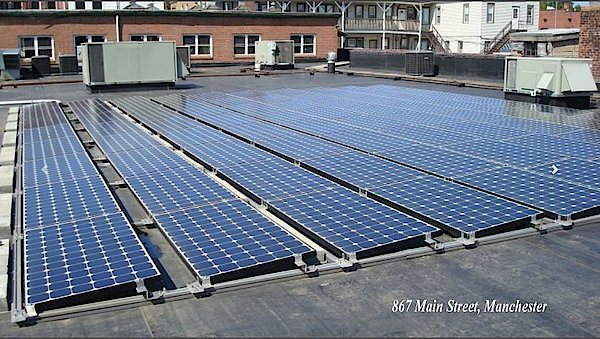
SolSmart in Connecticut Towns: Tripping the Light Fantastic
STORRS, CT, December 5, 2022 – Sustainable CT, a statewide, voluntary certification program that supports sustainability best practices in Connecticut municipalities, announced that four of its registered towns – Ashford, Bloomfield, Manchester and Stonington – have achieved SolSmart designation this year. SolSmart is a national program led by the International City/County Management Association (ICMA) and the Interstate Renewable Energy Council (IREC) that recognizes cities, counties, and regional organizations when they foster the development of mature local solar markets. According to the SolSmart website, more than 400 cities, counties, and regional organizations in 42 states, the District of Columbia, the U.S. Virgin Islands, and Puerto Rico have achieved SolSmart designation, representing over 107 million people.
Achieving at least Bronze-level status in the national SolSmart community designation yields twenty points towards Sustainable CT certification – the most points available for any one action in the Sustainable CT program. Each of Connecticut’s 169 municipalities has its own permitting process, permit application and fee structure, which makes widespread solar deployment a challenge. SolSmart encourages streamlining procedures and documentation so Connecticut towns can support and facilitate more sustainable projects, including solar, and bring more business to their communities.
“Achieving SolSmart provides a town national recognition and points in our program towards certification,” said Jessica LeClair, Sustainable CT’s senior program director, “and it’s an action that’s included in our Climate Leader Designation program, too, so it’s like a win-win-win. Historically, our SolSmart action (5.6.2) has not been very popular with towns because it’s one of the more challenging in our program, but now we’re thrilled to see towns trying and succeeding.”
LeClair added, “We're excited to continue our partnership with the Great Plains Institute to connect Connecticut municipalities with free technical support to work towards SolSmart designation in 2023. These four towns have demonstrated their commitment to advancing solar, enabling their residents and businesses to save on their electric bill while reducing greenhouse gas emissions.”
Manchester was among the Sustainable CT-registered towns that achieved SolSmart Bronze designation by creating an online permitting checklist to increase transparency for community members and solar installers; and by reviewing local zoning codes to identify restrictions that intentionally or unintentionally prohibited solar PV development.
Courtney Lindberg, Manchester’s deputy director of public works, said, “Manchester is now certified as a SolSmart Bronze town because we’re streamlining and promoting solar energy growth in our community. And we’re thrilled that Sustainable CT continues to support and encourage these kinds of programs to help local municipalities meet sustainability goals.”
Towns that are registered with Sustainable CT can work with technical service providers for free. Through this no-cost assistance program, technical assistance providers work directly with communities to lay out a path to achieve SolSmart Bronze designation. Interested parties should email Sustainable CT for more information or visit the SolSmart page of the Sustainable
CT web site.
About Sustainable CT
Sustainable CT is a voluntary certification program to recognize thriving and resilient Connecticut municipalities. An independently funded, grassroots, municipal effort, Sustainable CT provides a wide‐ranging menu of best practices. Municipalities choose Sustainable CT actions, implement them, and earn points toward certification.
Sustainable CT also provides opportunities for grant funding through its Community Match Fund program to help communities promote economic well‐being and enhance equity, all while respecting the finite capacity of the natural environment. The program is designed to support all Connecticut municipalities, regardless of size, geography, or resources. Sustainable CT empowers municipalities to create high collective impact for current and future residents.
24 Communities Achieve Prestigious Sustainable CT Certification, Five Towns Honored as Climate Leaders
STORRS, CT, October 31, 2022 – Sustainable CT, a statewide, voluntary certification program that supports sustainability best practices in Connecticut municipalities, announced an impressive list of 2022 certified communities and an inaugural cohort of Climate Leaders this week.
Twenty-four municipalities earned 2022 Sustainable CT certification. The following towns met high standards in a broad range of sustainability accomplishments to qualify for bronze-level certification: Ashford, Cheshire, Deep River, East Haddam, East Lyme, Goshen, Lyme, New London, Rocky Hill, Southbury, Stonington, Torrington, Waterford, West Haven, and Windsor. Towns that achieved silver-level certification, the highest level of certification currently offered by Sustainable CT, are Coventry, Darien, Essex, Guilford, Manchester, Mansfield, New Haven, Vernon, and Wilton.
In addition, Sustainable CT awarded its first-ever Climate Leader designations this fall. The program was piloted in 2022 to support the acceleration of municipal actions to reduce greenhouse gas emissions and adapt to the changing climate. Through successful implementation of multiple climate actions, five towns earned distinction as the first cohort of Sustainable CT Climate Leaders: Fairfield, Glastonbury, New Britain, Stratford, and West Hartford.
Sustainable CT offers support to help towns implement actions that build community connection, social equity, and long-term resilience. Certified communities demonstrated significant achievements in at least twelve sustainability impact areas, ranging from thriving local economies and vibrant arts and culture to clean transportation and affordable housing. In addition, certified municipalities addressed issues of equity and inclusion when implementing sustainability actions.
“Congratulations to our first-ever Sustainable CT Climate Leaders and our 2022 certified communities,” said Lynn Stoddard, executive director of Sustainable CT. “We are inspired by the leadership and commitment of these communities. From elected officials and town staff to resident volunteers, these certified towns and Climate Leaders are improving opportunities and the quality of life for all.”
“We are thrilled to recognize additional communities that are using the Sustainable CT framework to build long-term resilience to climate change,” said Bryan Garcia, co-chair of Sustainable CT and president and CEO of the Connecticut Green Bank. “Our support for equitable communities, affordable housing, clean and efficient transportation and energy, and resilient and accessible food systems, helps to strengthen and unify our communities faced with the impacts of climate change and its effect on our economy.”
Sustainable CT is celebrating its fifth anniversary this November and has seen strong momentum and growth as a valuable, high-impact program. One-hundred twenty-nine municipalities are participating in this free program, representing nearly 90% of the state’s population. Collectively, sixty-two municipalities, nearly 37% of the state’s communities, have earned Sustainable CT certification. Certification lasts for three years, with submissions rigorously evaluated by independent experts and other Sustainable CT partners.
All 2022 certified communities and Climate Leader award recipients will be recognized this year at Sustainable CT’s Awards Celebration being held at the West Hartford Town Hall on Monday, November 14, from 3–6 p.m. For more information about this, visit sustainablect.org/celebration.
Sustainable CT is independently funded, with strong multi-year support from the Emily Hall Tremaine Foundation, Hampshire Foundation, Connecticut Green Bank, Common Sense Fund, and the Community Foundation of Eastern Connecticut.
For more information, visit www.sustainablect.org.
About Sustainable CT
Sustainable CT is a voluntary certification program to recognize thriving and resilient Connecticut municipalities. An independently funded, grassroots, municipal effort, Sustainable CT provides a wide‐ranging menu of best practices. Municipalities choose Sustainable CT actions, implement them, and earn points toward certification.
Sustainable CT also provides opportunities for grant funding through its Community Match Fund program to help communities promote economic well‐being and enhance equity, all while respecting the finite capacity of the natural environment. The program is designed to support all Connecticut municipalities, regardless of size, geography, or resources. Sustainable CT empowers municipalities to create high collective impact for current and future residents.
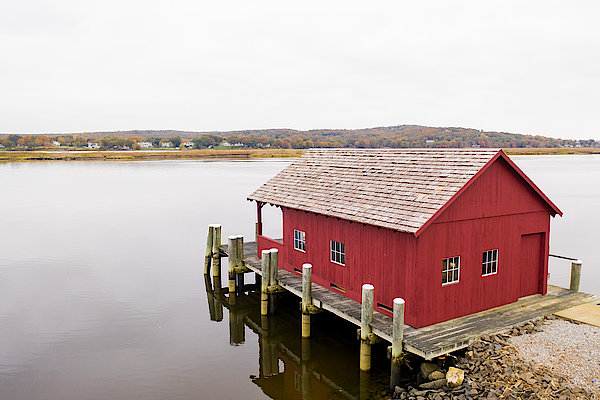
Five Communities Achieve Prestigious Sustainable CT Certification
STORRS, CT, May 31, 2022 - Sustainable CT, a statewide initiative that inspires and supports communities in becoming more resilient, inclusive and efficient, announced its 2022 spring certified communities this week.
In all, five towns qualified for certification during the 2022 spring submission cycle.
Guilford, Lyme and Southbury all met high standards in a broad range of sustainability accomplishments to qualify for bronze-level certification. Coventry and Vernon achieved silver-level certification, the highest level of certification currently offered.
Sustainable CT includes actions that help towns and cities build community connection, social equity, and long-term resilience. The program’s action roadmap and support tools are especially relevant as towns seek practices and resources to address climate change, promote racial justice, and recover from the impacts of COVID-19.
Seventeen municipalities submitted paperwork for the Spring 2022 certification cycle; of those, four towns submitted only for review. According to Lynn Stoddard, executive director of Sustainable CT, it’s common for municipalities involved in the program to do a significant amount of prep work in the spring with the goal of formal certification in the fall.
“Congratulations to our newest Sustainable CT certified communities,” said Stoddard. “It’s particularly gratifying to see so many municipalities doing the work now that lays the groundwork for certification in the fall. A growing number of Connecticut towns and cities are demonstrating practices that make our communities more inclusive, healthy, connected, and strong, and that bodes well for the entire state.”
Certified communities demonstrated significant achievements in at least twelve sustainability impact areas, ranging from community building, thriving local economies and vibrant arts and culture to clean transportation and diverse housing. In addition, certified municipalities addressed issues of belonging, equity, diversity, and inclusion when implementing sustainability actions. Sustainable CT provides free coaching and a virtual equity classroom to help municipalities with issues related to equity and racial justice.
“We are thrilled to recognize additional communities that are using the Sustainable CT framework to recover from the pandemic and build long-term resilience,” said Laura Francis, first selectman of Durham and co-chair of the Sustainable CT Board of Directors. “Supporting local businesses, strengthening food networks, and safeguarding natural spaces for our residents have always been important, but the pandemic further illuminated their importance.”
Sustainable CT has seen strong momentum and growth as a valuable, high-impact program. As of this certification cycle, one-hundred thirty municipalities have registered for the program. Collectively, sixty-six municipalities, nearly 40% of the state’s communities, have earned Sustainable CT certification. Certification lasts for three years, with submissions rigorously evaluated by independent experts and other Sustainable CT partners.
“Sustainable CT Certified communities are models for all forward-looking local governments,” said Joe DeLong, executive director and CEO of Connecticut Conference of Municipalities (CCM). “These municipalities have shown great leadership in completing many actions that increase sustainability while also saving money, promoting health, and deepening residents’ connection to community.”
Sustainable CT is independently funded, with strong multi-year support from the Emily Hall Tremaine Foundation, Hampshire Foundation, Connecticut Green Bank, Common Sense Fund, and the Community Foundation of Eastern Connecticut.
For more information, visit www.sustainablect.org.
About Sustainable CT
Sustainable CT is a voluntary certification program to recognize thriving and resilient Connecticut municipalities. An independently funded, grassroots, municipal effort, Sustainable CT provides a wide‐ranging menu of best practices. Municipalities choose Sustainable CT actions, implement them, and earn points toward certification.
Sustainable CT also provides opportunities for grant funding through its Community Match Fund program to help communities promote economic well‐being and enhance equity, all while respecting the finite capacity of the natural environment. The program is designed to support all Connecticut municipalities, regardless of size, geography, or resources. Sustainable CT empowers municipalities to create high collective impact for current and future residents.
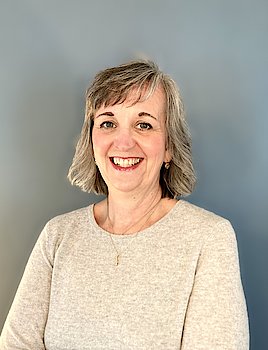
Sustainable CT Appoints New Certification Program Manager, Mary Dickerson
STORRS, CONN., April 4, 2021 – Sustainable CT is pleased to welcome Mary Dickerson onto its team as Certification Program Manager.
Ms. Dickerson will manage and further develop Sustainable CT’s certification program. The certification program provides a wide-ranging menu of best practices which municipalities may choose to implement to earn points toward certification and recognition.
Ms. Dickerson earned her Bachelor of Science in Business Administration with a concentration in Accounting from the University of Saint Joseph and received her International MBA from Central Connecticut State University. Her experience spans from Wall Street to Main Street, having worked as a Policy and Research Associate for an investment bank in Manhattan and later establishing Dickerson Development Consulting, LLC, providing economic development and strategic planning services to small municipalities and rural communities.
“I’m excited to become a member of the Sustainable CT staff!” said Ms. Dickerson. “Coming from municipal government, where I served as a Sustainable CT team member, I understand the rigorous work that goes into a successful certification process, and the rewards that result from creating a more sustainable community.”
“I’m particularly looking forward to developing the newest elements of Sustainable CT’s certification program – the Climate Leadership Designation pilot this year, and our Gold level standards due for rollout in 2023,” added Dickerson. “This is an exciting time to be a part of this highly-effective statewide organization.”
“Our certification program is at the heart of what we do,” said Lynn Stoddard, Sustainable CT executive director. “Participating towns are making a real difference in the quality of life for all their residents, and our certification roadmap helps guide them in creating thriving, resilient and sustainable communities.”
“We’re thrilled to have Mary join our team,” added Stoddard. “She has worked extensively with Connecticut towns and is well known and highly respected by municipal leaders. She understands the needs of towns and will provide strong leadership for our certification program and excellent support to our team, elected officials, town staff, residents, and our partners.”
Ms. Dickerson worked in a variety of roles for the Town of Portland, including Economic Development Coordinator and Planner. She has a passion for adaptive reuse, brownfield redevelopment, and open space preservation. Ms. Dickerson has served on the Board of Directors of the Middlesex County Chamber of Commerce, was a member of The Lower Connecticut River Valley Regional Planning Committee, and is a Trustee of the University of Saint Joseph, where she is also President of the Alumni Council. When not working, she can be found hiking and kayaking in New Hampshire’s lakes region.
Sustainable CT is an independently funded, grassroots, municipal effort. With over 129 Connecticut cities and towns registered, 38 bronze certified and 26 silver certified so far, the Sustainable CT certification program is the most comprehensive and wide-ranging sustainability program in the state. Sustainable CT urges those interested in registering their communities or achieving certification to reach out to Ms. Dickerson for more information.
Mary Dickerson
Sustainable CT – Certification Program Manager
[email protected]
About Sustainable CT
Sustainable CT is a voluntary certification program to recognize thriving and resilient Connecticut municipalities. An independently funded, grassroots, municipal effort, Sustainable CT provides a wide‐ranging menu of best practices. Municipalities choose Sustainable CT actions, implement them, and earn points toward certification.
Sustainable CT also provides opportunities for grant funding through its Community Match Fund program to help communities promote economic well‐being and enhance equity, all while respecting the finite capacity of the natural environment. The program is designed to support all Connecticut municipalities, regardless of size, geography, or resources. Sustainable CT empowers municipalities to create high collective impact for current and future residents.
New Funding Opportunity for Community Organizers
Sustainable CT and Supporting Organizing Work‐CT announce the creation of the Social Change Amplifier Fund
WILLIMANTIC, CT, March 10, 2022 – Supporting Organizing Work‐CT (SOW‐CT) has established the Social Change Amplifier Fund within Sustainable CT’s Community Match Fund to dedicate matching funds to projects led by Black, Latinx, Multiracial, Indigenous and other POC community organizers and organizations.
The Sustainable CT Community Match Fund is an established program that provides a dollar‐for‐dollar match for community‐initiated projects that align with Sustainable CT’s action roadmap to build inclusive, resilient, and thriving communities across Connecticut. Since its launch in late 2019, the Community Match Fund has invested over $1.1 million in two hundred community‐led projects throughout Connecticut, highly leveraging an additional $1.3 million of crowdfunding donations from residents, local businesses, towns, and others.
“Thanks to Supporting Organizing Work‐CT, we’ll be able to focus much needed attention on traditionally marginalized and underrepresented populations in Connecticut,” said Lynn Stoddard, Executive Director of Sustainable CT. “Organizers in communities of color will be better able to build collective power and leadership to affect positive change where it’s needed and wanted most.”
Sustainable CT will match up to $7,500 in one‐to‐one dollars from the Social Change Amplifier Match Fund. Unlike traditional grant programs, Sustainable CT offers a quick, simple application process (starting with a conversation) with no deadlines, no lengthy review period, and minimal reporting requirements. Sustainable CT helps applicants create a project description on their crowdfunding platform, provides a crowdfunding coach, and spreads the word about active projects to help bring in support.
In order to qualify for the Social Change Amplifier Match Fund, community projects should: be organized by Black, Latinx, Multiracial, Indigenous and POC leaders (grassroots groups, individual resident or nonprofit organization); provide broad public benefits to the community (not to support private businesses or individuals through such methods as bail funds or rental assistance); align with Sustainable CT’s action roadmap; and be planned for one or more of Sustainable CT’s registered towns.
Projects can include, but are not limited to: events, campaigns or community activities that promote public awareness and education; community canvasing, surveys, forums and meetings; vision sessions, and focus groups; community leadership training; murals and other public art; and restorative justice projects.
Supporting Organizing Work‐CT is supported by the Connecticut Council for Philanthropy through a funders collaborative that includes: Community Foundation for Greater New Haven, Connecticut Community Foundation, Emily Hall Tremaine Foundation, Fairfield County's Community Foundation, Hartford Foundation for Public Giving, Leever Foundation, Melville Charitable Trust, Nellie Mae Education Foundation, Perrin Family Foundation, The Tow Foundation, Universal Healthcare Foundation, and William Casper Graustein Memorial Fund.
Interested parties should contact [email protected] to schedule a call to discuss a project idea.
About Sustainable CT
Sustainable CT is a voluntary certification program to recognize thriving and resilient Connecticut municipalities. An independently funded, grassroots, municipal effort, Sustainable CT provides a wide‐ranging menu of best practices. Municipalities choose Sustainable CT actions, implement them, and earn points toward certification.
Sustainable CT also provides opportunities for grant funding through its Community Match Fund program to help communities promote economic well‐being and enhance equity, all while respecting the finite capacity of the natural environment. The program is designed to support all Connecticut municipalities, regardless of size, geography, or resources. Sustainable CT empowers municipalities to create high collective impact for current and future residents.
Twenty-three Communities Achieve Prestigious Sustainable CT Certification
WILLIMANTIC, CT, November 1, 2021 – Sustainable CT, a statewide initiative that inspires and supports communities in becoming more resilient, inclusive and efficient, announced its 2021 fall certified communities this week.
In all, the twenty-three towns qualified for certification during the 2021 fall submission cycle.
Canaan (Falls Village), Chester, Essex, the Town of Groton, North Stonington, Pomfret, Ridgefield, Suffield, Washington, West Haven, and Weston all met high standards in a broad range of sustainability accomplishments to qualify for bronze-level certification. Towns that achieved silver-level certification, the highest level of certification currently offered, include Fairfield, Glastonbury, Greenwich, Hartford, Litchfield, Milford, New Milford, Old Lyme, Portland, Trumbull, West Hartford, and Westport.
Sustainable CT, managed under the leadership of the Institute for Sustainable Energy at Eastern Connecticut State University, includes actions that help towns and cities build community connection, social equity, and long-term resilience. The program’s action roadmap and support tools are especially relevant as towns seek practices and resources to address climate change, promote racial justice, and recover from the impacts of COVID-19.
“Congratulations to our newest Sustainable CT certified communities,” said Lynn Stoddard, executive director of the program. “It’s particularly gratifying to see so many municipalities achieving certification this year. A growing number of Connecticut towns and cities are demonstrating practices that make our communities more inclusive, healthy, connected, and strong, and that bodes well for the entire state.”
Certified communities demonstrated significant achievements in at least eleven sustainability impact areas, ranging from community building, thriving local economies and vibrant arts and culture to clean transportation and diverse housing. In addition, certified municipalities addressed issues of belonging, equity, diversity, and inclusion when implementing sustainability actions. Sustainable CT provides free coaching and a virtual equity classroom to help municipalities with issues related to equity and racial justice.
“We are thrilled to recognize additional communities that are using the Sustainable CT framework to recover from the pandemic and build long-term resilience,” said Laura Francis, first selectman of Durham and co-chair of the Sustainable CT Board of Directors. “Supporting local businesses, strengthening food networks, and safeguarding natural spaces for our residents have always been important, but the pandemic further illuminated their importance.”
Sustainable CT has seen strong momentum and growth as a valuable, high-impact program. One-hundred twenty-five municipalities have registered for the program, representing 86% of the state’s population. Collectively, sixty-four municipalities, 60% of the state’s communities, have earned Sustainable CT certification. Certification lasts for 3 years, with submissions rigorously evaluated by independent experts and other Sustainable CT partners.
“Sustainable CT Certified communities are models for all forward-looking local governments,” said Joe DeLong, executive director and CEO of Connecticut Conference of Municipalities (CCM). “These municipalities have shown great leadership in completing many actions that increase sustainability while also saving money, promoting health, and deepening residents’ connection to community.” CCM will hold an awards ceremony to recognize Sustainable CT certified towns at their annual convention on November 30.
Sustainable CT is independently funded, with strong support from its three founding funders: the Emily Hall Tremaine Foundation, the Common Sense Fund, and the Smart Seed Fund. Additional support is provided by the Connecticut Green Bank and many community foundations.
For more information, visit www.sustainablect.org.

Sustainable CT Welcomes New Community Organizer and Partnership Manager, Joseph Dickerson
WILLIMANTIC, CT, November 1, 2021 – As Sustainable CT grows to fund new projects that advance equity and opportunity, we are excited to welcome Joseph Dickerson onto the team as the Community Organizer and Partnership Manager.
Joseph will oversee the ongoing development and expansion of the Sustainable CT Community Match Fund. While he is stepping into a successful system formerly headed by Abe Hilding-Salorio, we are looking forward to Joseph drawing on his experience with city, state, and federal government programs, community development, and entrepreneurship. He will help guide leaders and community teams as they innovate and grow diverse, inclusive sustainability projects across Connecticut.
In his former role as the BiCi Co Community Bike Shop program manager, Joseph oversaw the start-up and growth of a full-service, non-profit bike shop in a low-income neighborhood. The shop serves a community of youth and adult riders of Spanish and African descent, outside the lines of the stereotypical rider. He balanced the mission of educating youth and adults about bicycle maintenance and safe riding with the profit-driven imperative to reinvest in the community.
“Joining the Sustainable CT team is awesome,” Joseph said. “As the leader of BiCi Co’s successful community match funded project, I understand how much heart goes into every project. Each project represents the best of what community leaders know will positively and meaningfully impact the lives of their friends, family and neighbors.”
“We designed the Community Match Fund as a unique and exciting innovation on grant funding,” said Lynn Stoddard, Sustainable CT executive director. “We believe people know best what their communities need to thrive so we empower them to identify and champion local sustainability projects rather than prescribing how the dollars should be used.”
“We’re thrilled to bring Joseph onto our team,” added Lynn. “His community-based entrepreneurial background, and desire to connect people, will benefit towns and project leaders statewide and amplify the initial success of Sustainable CT’s Community Match Fund.”
Joseph is the owner and operator of Inspired Adventurist, supporting individuals and teams to plan, execute, and thrive in fulfilling their bucket-list outdoor adventures, and a board member of the Connecticut Outdoor Recreation Alliance (CORA). He is an avid fly-fisher, mountain biker, and happy dog dad. He received a bachelor’s degree with a major in educational psychology from Swarthmore College, and a master’s degree in public finance and community economic development from the Carnegie Mellon University Heinz College of Public Policy.
Sustainable CT serves as a catalyst for ideas that foster inclusive, resilient, and vibrant communities. With over $2.2 million in local investments, represented by 193 projects, the Community Match Fund has inspired nearly 10,000 individuals to invest dollars and time into community-led projects that improve the quality of life in Connecticut towns and cities. Sustainable CT urges interested parties to reach out to Joseph for more information.
Joseph Dickerson
Sustainable CT - Community Organizer and Partnership Manager
860-465-0256
[email protected]

Sustainable CT Community Match Fund Supports Branford’s Net-zero Animal Shelter
WILLIMANTIC, CT, October 12, 2021 – Sustainable CT, a statewide program that supports voluntary municipal initiatives to protect the environment and improve the quality of life for Connecticut residents, has announced its support for the Dan Cosgrove Animal Shelter.
The Dan Cosgrove Animal Shelter is a municipal animal shelter and animal control department serving Branford, North Branford and Northford. The shelter is known statewide for organizing programming for both children and adults, including those with special needs, to encourage socialization and early bonding with animals.
Sustainable CT, through its Community Match Fund program, is supporting the shelter’s goal of becoming the first net-zero animal shelter in the country. The shelter is currently raising money to build a permanent facility that will incorporate solar, thermal and high-performance building standards to achieve net-zero energy consumption.
In collaboration with the Branford Engineering Department, the Branford Office of Sustainability, and local green building experts, the shelter has designed a building that will utilize natural resources in a sustainable manner to reduce human – and animal – impact on the environment.
“We have amazing support from our residents and followers in Branford, North Branford and beyond,” said Laura Burban, the shelter’s director. “We have been working diligently for the last 18 months, during the pandemic, to raise money for our new building and are excited to make energy efficiency a defining component of our unique ‘state of the animal’ building.”
The Dan Cosgrove Animal Shelter has been helping homeless animals along the Connecticut shoreline and vicinity since April 2003. Its mission is to protect the public, provide excellent animal care, find good homes for our animal guests, promote responsible pet guardianship, work to end the overpopulation of feral cats in in the Branford area, and to run a well-organized, efficient shelter.
Hundreds of displaced animals come through the shelter’s doors each year. In addition to dogs and cats, Branford’s animal shelter serves as the temporary home for less common animals, too, including guinea pigs, chinchillas, rabbits, and even the occasional owl and deer.
Anyone wishing to support the Dan Cosgrove Animal Shelter’s net-zero building campaign can do so by visiting its Patronicity crowdfunding page. Every dollar donated through the site will be matched by Sustainable CT up $15,000.00, for a potential combined total of $30,000.00.
Sustainable CT has dedicated matching funds available to support public energy efficiency and renewable energy projects throughout the state of Connecticut. Anyone with an idea for a public, sustainability-related initiative is encouraged to send inquiries to [email protected].
Sustainable CT is independently funded, and the Community Match Fund is supported by the Smart Seed Fund, Emily Hall Tremaine Foundation, and the Connecticut Green Bank.
Sustainable CT Community Match Fund Surpasses $2 Million Investment in Connecticut Communities
WILLIMANTIC, CT, August 2, 2021 – Sustainable CT, a statewide program that supports municipal initiatives to protect the environment and improve the quality of life for Connecticut residents, has surpassed the $2 million mark in investment in local projects through its Community Match Fund.
Since its inception in September of 2019, the Sustainable CT Community Match Fund has invested in over 170 local projects in more than 70 Connecticut towns.
The Community Match Fund leverages institutional funding alongside community investment in the form of individual, small-dollar donations to hyper-local projects. Each project runs a public crowdfunding campaign to engage the community and secure half the funding needed to complete its work. Sustainable CT then matches every dollar raised. To date, Sustainable CT has committed $930,000 as a match to more than $1.1 million collected from over eight thousand individual donations.
The unique method of funding demonstrates grassroots support for a project, according to Lynn Stoddard, executive director of Sustainable CT. “The most impactful aspect of this program is that each donation represents a person who is now involved with and committed to the project,” said Stoddard. “When neighbors vote with their dollars in support of these projects they are literally buying in, which creates a sense of community ownership that wouldn’t otherwise exist.”
“Residents are inspired to take action and they lead the way in improving their communities one block, one neighborhood, and one town at a time,” added Abe Hilding-Salorio, Sustainable CT’s outreach coordinator. “They demonstrate the power of neighbors, friends, colleagues, and local businesses working together to support change right in their own backyards.”
Across the state, these projects are making towns and cities more inclusive, resilient, and vibrant for all residents. Community members are working together to bring main streets to life with pocket parks, murals, and tree plantings; create green jobs for low-income residents; recycle bikes for people in need of safe, affordable transportation; make public lands productive and beautiful by planting pollinator pathways; educate neighbors on climate solutions; clean up rivers and protect habitats; and create vibrant spaces for everyone to enjoy.
Unlike most traditional grant programs, the Community Match Fund is open to anyone. Project leaders don’t need the backing of a formal organization, there is no application to submit, no deadlines, and no subjective review and scoring process. Anyone who has an idea for a public project is welcome to reach out to Sustainable CT at any time, and if their work aligns with that of Sustainable CT, they will quickly be approved and moved forward.
“What’s so exciting about this program is how it puts decision-making in the hands of the people who will be most impacted by the project,” said Hilding-Salorio. “Rather than Sustainable CT deciding what work has value and deserves to be funded, we’re asking the local community to make that determination.”
The Community Match Fund continues to accept and support new projects on a rolling basis. Anyone with an idea for a public, sustainability-related initiative is encouraged to contact Abe Hilding-Salorio at Sustainable CT.
Sustainable CT is independently funded, and the Community Match Fund is supported by the Smart Seed Fund, Emily Hall Tremaine Foundation, and the Connecticut Green Bank.

